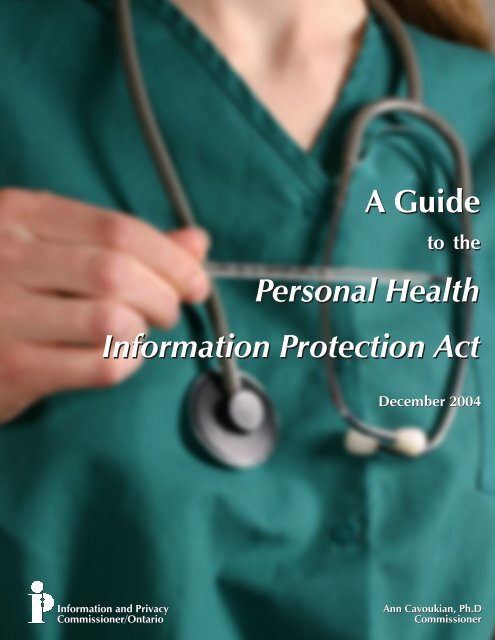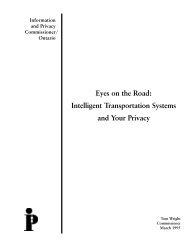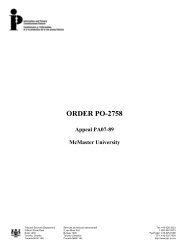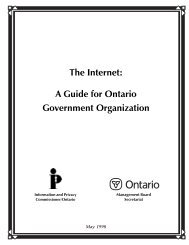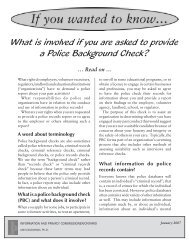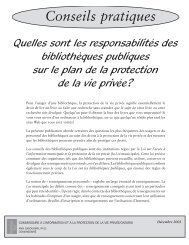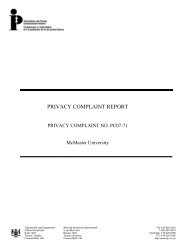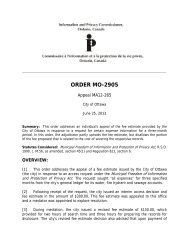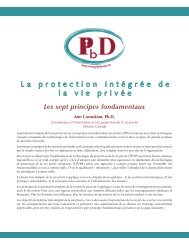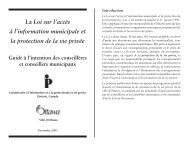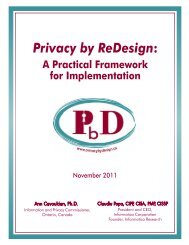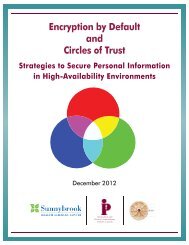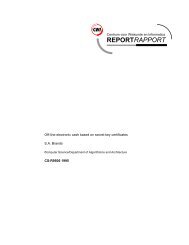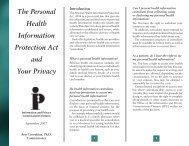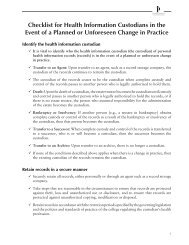A Guide to the Personal Health Information Protection Act
A Guide to the Personal Health Information Protection Act
A Guide to the Personal Health Information Protection Act
You also want an ePaper? Increase the reach of your titles
YUMPU automatically turns print PDFs into web optimized ePapers that Google loves.
A <strong>Guide</strong><br />
<strong>to</strong> <strong>the</strong><br />
<strong>Personal</strong> <strong>Health</strong><br />
<strong>Information</strong> <strong>Protection</strong> <strong>Act</strong><br />
December 2004<br />
<strong>Information</strong> and Privacy<br />
Commissioner/Ontario<br />
Ann Cavoukian, Ph.D<br />
Commissioner
Dr. Ann Cavoukian, <strong>the</strong> <strong>Information</strong> and Privacy Commissioner of Ontario,<br />
gratefully acknowledges <strong>the</strong> work of Debra Grant in preparing this guide.<br />
This publication is also available on <strong>the</strong> IPC website.<br />
Cette publication est également disponible en français.<br />
Disclaimer<br />
This practical guide is based on <strong>the</strong> <strong>Personal</strong> <strong>Health</strong> <strong>Information</strong> <strong>Protection</strong><br />
<strong>Act</strong> and its regulations. The interpretation of this legislation in this guide<br />
should not be relied upon as a substitute for <strong>the</strong> legislation or legal advice. This<br />
guide should be used in conjunction with <strong>the</strong> <strong>Personal</strong> <strong>Health</strong> <strong>Information</strong><br />
<strong>Protection</strong> <strong>Act</strong>. This guide is not an official legal interpretation of <strong>the</strong><br />
legislation and is not binding on <strong>the</strong> Office of <strong>the</strong> <strong>Information</strong> and Privacy<br />
Commissioner of Ontario.<br />
<strong>Information</strong> and Privacy<br />
Commissioner/Ontario<br />
2 Bloor Street East<br />
Suite 1400<br />
Toron<strong>to</strong>, Ontario<br />
M4W 1A8<br />
416-326-3333<br />
1-800-387-0073<br />
Fax: 416-325-9195<br />
TTY (Teletypewriter): 416-325-7539<br />
Website: www.ipc.on.ca
What you'll find in this <strong>Guide</strong><br />
Introduction................................................................................................................1<br />
The purpose of this guide ...........................................................................................2<br />
An overview ................................................................................................................3<br />
Does <strong>the</strong> <strong>Act</strong> apply <strong>to</strong> you? .........................................................................................4<br />
What information does <strong>the</strong> <strong>Act</strong> protect? .....................................................................7<br />
Practices <strong>to</strong> protect personal health information .........................................................9<br />
Collection, use and disclosure of personal health information ..................................15<br />
Access <strong>to</strong> personal health information records ..........................................................31<br />
Correction ................................................................................................................33<br />
How will <strong>the</strong> <strong>Act</strong> be enforced? ..................................................................................35<br />
Definitions ................................................................................................................37
Quick reference guide <strong>to</strong> Examples<br />
Example 1: Does <strong>the</strong> <strong>Act</strong> apply <strong>to</strong> you? ...................................................................6<br />
Example 2: What information does <strong>the</strong> <strong>Act</strong> protect? ...............................................8<br />
Example 3:<br />
When can you rely on implied consent?..............................................12<br />
Example 4: Who can act as a substitute decision-maker? .......................................14<br />
Example 5:<br />
Example 6:<br />
Example 7:<br />
Example 8:<br />
Example 9:<br />
Can personal health information be used for fundraising activities?....17<br />
What information is a cus<strong>to</strong>dian authorized<br />
<strong>to</strong> collect from individuals?.................................................................19<br />
For what purposes is a cus<strong>to</strong>dian permitted <strong>to</strong> use<br />
personal health information without <strong>the</strong> consent of <strong>the</strong> individual? ...21<br />
Can a cus<strong>to</strong>dian override an individual’s express instruction<br />
not <strong>to</strong> disclose personal health information for <strong>the</strong> provision<br />
of health care? ....................................................................................24<br />
For what purposes is a cus<strong>to</strong>dian permitted<br />
<strong>to</strong> disclose personal health information? .............................................27<br />
Example 10: For what purposes can a recipient use and disclose personal<br />
health information that he or she receives from a cus<strong>to</strong>dian? ..............30<br />
Example 11: Does <strong>the</strong> right of access extend<br />
<strong>to</strong> all types of personal health information? ........................................32<br />
Example 12: What personal health information<br />
is <strong>the</strong> cus<strong>to</strong>dian required <strong>to</strong> correct? ...................................................34
Introduction<br />
The <strong>Personal</strong> <strong>Health</strong> <strong>Information</strong> <strong>Protection</strong> <strong>Act</strong> sets out rules for <strong>the</strong> collection, use and<br />
disclosure of personal health information. These rules will apply <strong>to</strong> all health information<br />
cus<strong>to</strong>dians operating within <strong>the</strong> province of Ontario and <strong>to</strong> individuals and organizations that<br />
receive personal health information from health information cus<strong>to</strong>dians. The rules recognize<br />
<strong>the</strong> unique character of personal health information – as one of <strong>the</strong> most sensitive types of<br />
personal information that is frequently shared for a variety of purposes, including care and<br />
treatment, health research, and managing our publicly funded health care system.<br />
The legislation balances individuals’ right <strong>to</strong> privacy with respect <strong>to</strong> <strong>the</strong>ir own personal health<br />
information with <strong>the</strong> legitimate needs of persons and organizations providing health care<br />
services <strong>to</strong> access and share this information. With limited exceptions, <strong>the</strong> legislation requires<br />
health information cus<strong>to</strong>dians <strong>to</strong> obtain consent before <strong>the</strong>y collect, use or disclose personal<br />
health information. In addition, individuals have <strong>the</strong> right <strong>to</strong> access and request correction of<br />
<strong>the</strong>ir own personal health information.<br />
1
The purpose of this guide<br />
This guide was created <strong>to</strong> give health information cus<strong>to</strong>dians a basic understanding of how<br />
<strong>the</strong> <strong>Personal</strong> <strong>Health</strong> <strong>Information</strong> <strong>Protection</strong> <strong>Act</strong> (<strong>the</strong> <strong>Act</strong>) applies in <strong>the</strong> course of day-<strong>to</strong>-day<br />
activities.<br />
This guide has been designed <strong>to</strong> help health information cus<strong>to</strong>dians understand <strong>the</strong>ir rights<br />
and obligations under <strong>the</strong> legislation. The guide provides information about how <strong>the</strong><br />
legislation will apply in some common scenarios and provides answers <strong>to</strong> <strong>the</strong> most frequently<br />
asked questions of health information cus<strong>to</strong>dians. The guide will not answer every potential<br />
question that a health information cus<strong>to</strong>dian may have about <strong>the</strong> application of <strong>the</strong> <strong>Act</strong>. The<br />
user can refer <strong>to</strong> <strong>the</strong> comprehensive Table of Contents or <strong>the</strong> Quick Reference <strong>Guide</strong> for<br />
answers <strong>to</strong> common questions.<br />
The guide is not intended <strong>to</strong> provide a comprehensive explanation of <strong>the</strong> <strong>Act</strong>. The guide<br />
describes <strong>the</strong> major rights and duties established by <strong>the</strong> <strong>Act</strong> and <strong>the</strong> general rules for a health<br />
information cus<strong>to</strong>dian <strong>to</strong> follow in exercising those rights and fulfilling those duties.<br />
Suggestions are made about how <strong>to</strong> apply <strong>the</strong> <strong>Act</strong> in different situations that may arise in<br />
practice. The guide is not a substitute for legal advice. If you are not sure how <strong>the</strong> <strong>Act</strong> should<br />
be applied in a given situation, you should contact <strong>the</strong> person in your organization who is<br />
responsible for facilitating compliance with <strong>the</strong> <strong>Act</strong>, a lawyer, <strong>the</strong> Ministry of <strong>Health</strong> and<br />
Long-Term Care, or <strong>the</strong> Office of <strong>the</strong> <strong>Information</strong> and Privacy Commissioner of Ontario.<br />
Important points made in this guide are emphasized with boldface type. Words or phrases<br />
with a specific meaning under <strong>the</strong> <strong>Act</strong> are printed in italics. These words are defined in <strong>the</strong><br />
glossary at <strong>the</strong> end of <strong>the</strong> guide. Please pay particular attention <strong>to</strong> <strong>the</strong> definitions in <strong>the</strong> <strong>Act</strong>,<br />
as <strong>the</strong>y are extremely important for determining basic issues such as what information is<br />
subject <strong>to</strong> <strong>the</strong> <strong>Act</strong> and who is subject <strong>to</strong> <strong>the</strong> <strong>Act</strong>.<br />
2
An overview<br />
The <strong>Personal</strong> <strong>Health</strong> <strong>Information</strong> <strong>Protection</strong> <strong>Act</strong> is an in-depth piece of legislation designed<br />
<strong>to</strong> address very complex issues concerning <strong>the</strong> collection, use and disclosure of personal health<br />
information by health information cus<strong>to</strong>dians.<br />
Individuals are very concerned about how <strong>the</strong>ir personal health information is collected, used<br />
and disclosed. They expect <strong>the</strong>ir health care providers <strong>to</strong> protect this information and not <strong>to</strong><br />
use or disclose it, intentionally or inadvertently, for purposes not related <strong>to</strong> <strong>the</strong>ir care and<br />
treatment. But, at <strong>the</strong> same time, it is generally unders<strong>to</strong>od that some information is needed<br />
<strong>to</strong> manage our publicly funded health care system, for health research and o<strong>the</strong>r purposes that<br />
have social value. Family members, <strong>the</strong> law enforcement community, medical officers of<br />
health, and o<strong>the</strong>rs may also have a legitimate need <strong>to</strong> access personal health information,<br />
under limited and specific circumstances. The <strong>Act</strong> sets out rules <strong>to</strong> balance different interests<br />
in circumstances where <strong>the</strong> needs of o<strong>the</strong>r parties may affect or conflict with <strong>the</strong> individual’s<br />
right <strong>to</strong> privacy. The object of <strong>the</strong> rules is <strong>to</strong> maximize both <strong>the</strong> benefits of respecting privacy<br />
and <strong>the</strong> benefits of collecting, using and disclosing personal health information for purposes<br />
that go beyond <strong>the</strong> care and treatment of <strong>the</strong> individual, but are socially beneficial.<br />
The <strong>Act</strong> is divided in<strong>to</strong> nine parts, each dealing with a different <strong>to</strong>pic. These <strong>to</strong>pics include:<br />
• Interpretation and application;<br />
• Practices <strong>to</strong> protect personal health information;<br />
• Consent concerning personal health information;<br />
• Collection, use and disclosure of personal health information;<br />
• Access <strong>to</strong> records of personal health information and correction;<br />
• Administration and enforcement;<br />
• General;<br />
• Complementary amendments;<br />
• Commencement and short title.<br />
The <strong>Act</strong> does not require health information cus<strong>to</strong>dians <strong>to</strong> completely set aside <strong>the</strong>ir existing<br />
information practices. <strong>Health</strong> care providers are bound by professional codes of practice that<br />
protect privacy. In many respects, <strong>the</strong> <strong>Act</strong> will not conflict with <strong>the</strong> pre-existing codes of<br />
practice and health care professionals should continue <strong>to</strong> follow <strong>the</strong>se codes. However, where<br />
<strong>the</strong>re is a conflict and <strong>the</strong> <strong>Act</strong> prohibits a practice that a professional code would allow, health<br />
care professionals are legally bound <strong>to</strong> comply with <strong>the</strong> <strong>Act</strong>.<br />
In most cases, <strong>the</strong> <strong>Act</strong> will require changes <strong>to</strong> <strong>the</strong> existing information practices of health<br />
information cus<strong>to</strong>dians. However, it is important <strong>to</strong> note that <strong>the</strong> <strong>Act</strong> has been designed <strong>to</strong><br />
enhance privacy while minimizing <strong>the</strong> impact on <strong>the</strong> patient-provider relationship.<br />
3
Does <strong>the</strong> <strong>Act</strong> apply <strong>to</strong> you?<br />
General<br />
The <strong>Act</strong> will have an impact on every individual residing in <strong>the</strong> province of Ontario. In general,<br />
<strong>the</strong> <strong>Act</strong> will provide individuals with more control over how <strong>the</strong>ir personal health information<br />
is collected, used and disclosed by health information cus<strong>to</strong>dians. With some exceptions,<br />
individuals will be able <strong>to</strong> access and request correction of <strong>the</strong>ir own personal health<br />
information.<br />
The <strong>Act</strong> does not apply <strong>to</strong> all personal health information, but only that which is collected,<br />
used and disclosed by health information cus<strong>to</strong>dians. The <strong>Act</strong> also applies <strong>to</strong> <strong>the</strong> use and<br />
disclosure of personal health information by those persons who receive personal health<br />
information from health information cus<strong>to</strong>dians. For example, recipients may include<br />
insurance companies, employers, researchers, and o<strong>the</strong>rs. Those who perform services on<br />
behalf of a health information cus<strong>to</strong>dian are defined as agents. Agents of health information<br />
cus<strong>to</strong>dians are also required <strong>to</strong> follow <strong>the</strong> rules set out in <strong>the</strong> <strong>Act</strong>.<br />
Are you a cus<strong>to</strong>dian?<br />
The <strong>Act</strong> defines a health information cus<strong>to</strong>dian. Seven broad categories of health information<br />
cus<strong>to</strong>dians are included in <strong>the</strong> definition. In general, persons involved in delivering health care<br />
services are included. For example, health care practitioners, long-term-care service providers,<br />
community care access corporations, hospitals and o<strong>the</strong>r facilities, pharmacies, labora<strong>to</strong>ries,<br />
a medical officer of health or a board of health, <strong>the</strong> Ministry of <strong>Health</strong> and Long-Term Care,<br />
and o<strong>the</strong>rs are specifically included in <strong>the</strong> definition. It is important <strong>to</strong> note that health care<br />
practitioners include anyone who provides health care for payment, whe<strong>the</strong>r or not <strong>the</strong><br />
services are publicly funded. The Canadian Blood Services has been designated as a health<br />
information cus<strong>to</strong>dian by regulation. O<strong>the</strong>rs can be added <strong>to</strong> this list as necessary. <strong>Health</strong><br />
information cus<strong>to</strong>dians will be referred <strong>to</strong> as cus<strong>to</strong>dians throughout <strong>the</strong> balance of this guide.<br />
Are you an agent of a cus<strong>to</strong>dian?<br />
Under <strong>the</strong> <strong>Act</strong>, you are considered <strong>to</strong> be an agent if, with respect <strong>to</strong> personal health<br />
information:<br />
• you are authorized <strong>to</strong> act on behalf of a cus<strong>to</strong>dian; and<br />
• you perform activities for <strong>the</strong> purposes of a cus<strong>to</strong>dian ra<strong>the</strong>r than your own purposes;<br />
• whe<strong>the</strong>r or not you have <strong>the</strong> authority <strong>to</strong> bind <strong>the</strong> cus<strong>to</strong>dian;<br />
• whe<strong>the</strong>r or not you are employed by <strong>the</strong> cus<strong>to</strong>dian; and<br />
• whe<strong>the</strong>r or not you are receiving remuneration.<br />
4
For example, agents may include employees, volunteers, information processors, and<br />
information managers. It is important for persons <strong>to</strong> determine if <strong>the</strong>y are agents so that <strong>the</strong>y<br />
will know if <strong>the</strong>y are bound by <strong>the</strong> <strong>Act</strong>. It is also important for cus<strong>to</strong>dians <strong>to</strong> identify <strong>the</strong>ir<br />
agents and appropriately inform <strong>the</strong>m of <strong>the</strong>ir duties under <strong>the</strong> <strong>Act</strong>.<br />
Do you provide information technology services <strong>to</strong> a cus<strong>to</strong>dian?<br />
The <strong>Act</strong> also includes a number of requirements for service providers, some of whom may not<br />
be considered <strong>to</strong> be agents of <strong>the</strong> cus<strong>to</strong>dian. If you are not an agent of <strong>the</strong> cus<strong>to</strong>dian, but<br />
provide goods or services that enable <strong>the</strong> cus<strong>to</strong>dian <strong>to</strong> use electronic means <strong>to</strong> collect, use,<br />
modify, disclose, retain or dispose of personal health information, you must comply with<br />
certain restrictions on <strong>the</strong> use and disclosure of that information that are set out in <strong>the</strong><br />
regulations that accompany <strong>the</strong> <strong>Act</strong>. In addition, whe<strong>the</strong>r or not you are an agent of <strong>the</strong><br />
cus<strong>to</strong>dian, if you are a health information network provider that enables cus<strong>to</strong>dians <strong>to</strong> share<br />
personal health information by electronic means, you must fulfil a number of duties that are<br />
set out in <strong>the</strong> regulations. These requirements are discussed in more detail later in this guide.<br />
Are you a recipient?<br />
The <strong>Act</strong> applies <strong>to</strong> <strong>the</strong> use and disclosure of personal health information by persons who receive<br />
<strong>the</strong> information from a cus<strong>to</strong>dian, regardless of when <strong>the</strong> information was received. It is<br />
important <strong>to</strong> know if you have received personal health information from a cus<strong>to</strong>dian since<br />
<strong>the</strong> <strong>Act</strong> places restrictions on what recipients may do with that information. Provincial and<br />
municipal government organizations that are not cus<strong>to</strong>dians are not bound by <strong>the</strong> restrictions<br />
<strong>the</strong> <strong>Act</strong> places on o<strong>the</strong>r recipients of personal health information.<br />
Does <strong>the</strong> <strong>Act</strong> apply <strong>to</strong> you? 5
Example 1: Does <strong>the</strong> <strong>Act</strong> apply <strong>to</strong> you?<br />
A registered nurse works for a private company involved in <strong>the</strong> manufacture of goods using<br />
chemicals that can be <strong>to</strong>xic <strong>to</strong> individuals after prolonged exposure. The nurse has been hired <strong>to</strong><br />
regularly test employees of <strong>the</strong> company for levels of various <strong>to</strong>xins <strong>to</strong> determine whe<strong>the</strong>r it is safe<br />
for <strong>the</strong> employees <strong>to</strong> continue working under conditions where <strong>the</strong>y are exposed <strong>to</strong> <strong>the</strong>se chemicals.<br />
Once certain levels of <strong>to</strong>xins are detected in <strong>the</strong>ir blood, employees are transferred <strong>to</strong> o<strong>the</strong>r divisions<br />
of <strong>the</strong> company where <strong>the</strong>re is no exposure <strong>to</strong> <strong>the</strong>se chemicals. On a monthly basis, <strong>the</strong> nurse provides<br />
a report <strong>to</strong> <strong>the</strong> management of <strong>the</strong> company specifying whe<strong>the</strong>r it is safe for each employee <strong>to</strong><br />
continue working under conditions of exposure. The information obtained by <strong>the</strong> nurse from testing<br />
of <strong>the</strong> employees is used for no o<strong>the</strong>r purpose. Is <strong>the</strong> nurse subject <strong>to</strong> <strong>the</strong> <strong>Act</strong>?<br />
Is <strong>the</strong> manufacturing company a health information cus<strong>to</strong>dian?<br />
The manufacturing company is not a cus<strong>to</strong>dian since such companies are not included in <strong>the</strong><br />
list of persons and organizations set out under <strong>the</strong> definition of a health information cus<strong>to</strong>dian<br />
contained in <strong>the</strong> <strong>Act</strong>.<br />
Is <strong>the</strong> nurse a cus<strong>to</strong>dian?<br />
A registered nurse is a health care practitioner, which is included in <strong>the</strong> list of persons and<br />
organizations set out under <strong>the</strong> definition of a cus<strong>to</strong>dian in <strong>the</strong> <strong>Act</strong>, so <strong>the</strong> nurse in this<br />
scenario could be a cus<strong>to</strong>dian. Whe<strong>the</strong>r <strong>the</strong> nurse is a cus<strong>to</strong>dian would be determined by<br />
whe<strong>the</strong>r <strong>the</strong> information that is collected, used or disclosed by <strong>the</strong> nurse is personal health<br />
information as defined in <strong>the</strong> <strong>Act</strong> and whe<strong>the</strong>r <strong>the</strong> scope of <strong>the</strong> nurse’s duties includes <strong>the</strong><br />
provision of health care.<br />
Is <strong>the</strong> information personal health information?<br />
The definition of personal health information includes information that relates <strong>to</strong> <strong>the</strong><br />
provision of health care <strong>to</strong> individuals. <strong>Health</strong> care is broadly defined <strong>to</strong> include an assessment<br />
that is done for a health-related purpose and that is carried out <strong>to</strong> maintain an individual’s<br />
physical condition. Accordingly, this information would be included, unless it is subject <strong>to</strong><br />
an exception.<br />
Is <strong>the</strong> information subject <strong>to</strong> an exception <strong>to</strong> <strong>the</strong> definition of personal health information?<br />
<strong>Information</strong> contained in a record that relates <strong>to</strong> an employee of a cus<strong>to</strong>dian that is<br />
maintained for a purpose o<strong>the</strong>r than <strong>the</strong> provision of health care is excluded from <strong>the</strong><br />
definition of personal health information. Since, in this scenario, <strong>the</strong> employees of <strong>the</strong><br />
manufacturing company are not employees of <strong>the</strong> cus<strong>to</strong>dian (i.e., <strong>the</strong> nurse) and <strong>the</strong><br />
information is used primarily for <strong>the</strong> purpose of providing health care <strong>to</strong> <strong>the</strong> individuals, <strong>the</strong><br />
information is not subject <strong>to</strong> <strong>the</strong> exception. The nurse, and <strong>the</strong> personal health information<br />
that she collects, uses and discloses, are subject <strong>to</strong> <strong>the</strong> <strong>Act</strong>.<br />
6<br />
6<br />
Does <strong>the</strong> <strong>Act</strong> apply <strong>to</strong> you?
What information does <strong>the</strong> <strong>Act</strong> protect?<br />
The <strong>Act</strong> applies <strong>to</strong> personal health information that is collected, used or disclosed by<br />
cus<strong>to</strong>dians. <strong>Personal</strong> health information includes oral or written information about <strong>the</strong><br />
individual, if <strong>the</strong> information:<br />
• relates <strong>to</strong> <strong>the</strong> individual’s physical or mental health, including family health his<strong>to</strong>ry;<br />
• relates <strong>to</strong> <strong>the</strong> provision of health care, including <strong>the</strong> identification of persons providing<br />
care;<br />
• is a plan of service for individuals requiring long-term care;<br />
• relates <strong>to</strong> payment or eligibility for health care;<br />
• relates <strong>to</strong> <strong>the</strong> donation of body parts or bodily substances or is derived from <strong>the</strong> testing<br />
or examination of such parts or substances;<br />
• is <strong>the</strong> individual’s health number; or<br />
• identifies an individual’s substitute decision-maker.<br />
Any o<strong>the</strong>r information about an individual that is included in a record containing personal<br />
health information is also included in <strong>the</strong> definition. Employee records of a cus<strong>to</strong>dian are<br />
excluded from <strong>the</strong> definition provided that <strong>the</strong> records are used primarily for purposes o<strong>the</strong>r<br />
than providing health care. Also, <strong>the</strong> <strong>Act</strong> does not apply <strong>to</strong> information about an individual,<br />
if <strong>the</strong> information could not reasonably be used <strong>to</strong> identify <strong>the</strong> individual.<br />
7
Example 2: What information does <strong>the</strong> <strong>Act</strong> protect?<br />
An insurance company maintains records of prescription drug claims for individuals<br />
enrolled in group health insurance plans. Individuals submit <strong>the</strong>ir claims for prescription<br />
drugs directly <strong>to</strong> <strong>the</strong> insurance company. Is this information subject <strong>to</strong> <strong>the</strong> <strong>Act</strong>?<br />
Is <strong>the</strong> information personal health information?<br />
The information in question is identifying information that relates <strong>to</strong> <strong>the</strong><br />
provision of health care <strong>to</strong> <strong>the</strong> individual. As such, it would fall within <strong>the</strong> types<br />
of information included in <strong>the</strong> definition of personal health information.<br />
However, <strong>the</strong> <strong>Act</strong> only applies <strong>to</strong> personal health information if it is in <strong>the</strong><br />
cus<strong>to</strong>dy or control of a cus<strong>to</strong>dian, or in <strong>the</strong> cus<strong>to</strong>dy or control of an individual<br />
or organization who received it from a cus<strong>to</strong>dian.<br />
Is <strong>the</strong> insurance company a health information cus<strong>to</strong>dian?<br />
Insurance companies are not included in <strong>the</strong> definition of a cus<strong>to</strong>dian. Since <strong>the</strong><br />
information is not in <strong>the</strong> cus<strong>to</strong>dy or control of a cus<strong>to</strong>dian, it would not be<br />
subject <strong>to</strong> <strong>the</strong> <strong>Act</strong> unless <strong>the</strong> insurance company received <strong>the</strong> information from<br />
a cus<strong>to</strong>dian.<br />
Is <strong>the</strong> insurance company a recipient of personal health information from a<br />
cus<strong>to</strong>dian?<br />
Since <strong>the</strong> insurance company obtains <strong>the</strong> information directly from <strong>the</strong><br />
individual, <strong>the</strong> insurance company is not subject <strong>to</strong> <strong>the</strong> rules that would apply<br />
<strong>to</strong> persons and organizations that receive information from a cus<strong>to</strong>dian.<br />
8<br />
What information does <strong>the</strong> <strong>Act</strong> protect?
Practices <strong>to</strong> protect personal health<br />
information<br />
General<br />
Cus<strong>to</strong>dians must implement and follow information practices that comply with <strong>the</strong> <strong>Act</strong> and<br />
its regulations. <strong>Information</strong> practices mean <strong>the</strong> policy about when, how and <strong>the</strong> purposes for<br />
which <strong>the</strong> cus<strong>to</strong>dian routinely collects, uses, modifies, discloses, retains or disposes of personal<br />
health information and <strong>the</strong> administrative, technical and physical safeguards and practices<br />
that <strong>the</strong> cus<strong>to</strong>dian has in place.<br />
Cus<strong>to</strong>dians must take reasonable steps <strong>to</strong> ensure that personal health information is as<br />
accurate, complete and up-<strong>to</strong>-date as necessary for <strong>the</strong> purposes for which it is used and<br />
disclosed. Cus<strong>to</strong>dians must exercise <strong>the</strong>ir judgment in deciding how accurate <strong>the</strong> information<br />
should be. For example, personal health information that is used for treatment purposes may<br />
require a higher degree of accuracy than information that is used for administrative purposes<br />
only. Cus<strong>to</strong>dians must also inform recipients of personal health information about any<br />
limitations on <strong>the</strong> accuracy of <strong>the</strong> information.<br />
Cus<strong>to</strong>dians must take steps that are reasonable in <strong>the</strong> circumstances <strong>to</strong> ensure that personal<br />
health information in <strong>the</strong>ir cus<strong>to</strong>dy or control is protected from <strong>the</strong>ft, loss and unauthorized<br />
use or disclosure. Records of personal health information must also be protected against<br />
unauthorized copying, modification or disposal. The cus<strong>to</strong>dian must notify individuals if<br />
personal health information is s<strong>to</strong>len, lost or accessed by an unauthorized person. However,<br />
cus<strong>to</strong>dians who are researchers and received personal health information from ano<strong>the</strong>r<br />
cus<strong>to</strong>dian should not notify individuals, unless <strong>the</strong> o<strong>the</strong>r cus<strong>to</strong>dian informs <strong>the</strong> researcher that<br />
<strong>the</strong> individual has consented <strong>to</strong> being contacted by <strong>the</strong> researcher.<br />
<strong>Information</strong> Technology Service Providers<br />
Persons who provide services <strong>to</strong> enable a cus<strong>to</strong>dian <strong>to</strong> use electronic means <strong>to</strong> collect, use,<br />
modify, disclose, retain or dispose of personal health information, but are not agents of <strong>the</strong><br />
cus<strong>to</strong>dian, must comply with restrictions on <strong>the</strong> use and disclosure of that information.<br />
Specifically, <strong>the</strong> information cannot be used, except as necessary in <strong>the</strong> course of providing<br />
<strong>the</strong> service, or disclosed under any circumstances. Service providers must ensure that <strong>the</strong>ir<br />
employees or any o<strong>the</strong>r person acting on <strong>the</strong>ir behalf comply with <strong>the</strong> restrictions that apply<br />
<strong>to</strong> service providers.<br />
In addition, whe<strong>the</strong>r or not you are an agent of <strong>the</strong> cus<strong>to</strong>dian, a health information network<br />
provider who provides information technology that allows two or more cus<strong>to</strong>dians <strong>to</strong> share<br />
personal health information electronically must:<br />
9
• Notify <strong>the</strong> cus<strong>to</strong>dian of any breach of <strong>the</strong> restrictions on its use and disclosure of personal<br />
health information or unauthorized access;<br />
• Make available <strong>to</strong> <strong>the</strong> public, information about <strong>the</strong> services provided <strong>to</strong> <strong>the</strong> cus<strong>to</strong>dian;<br />
any directives, guidelines and policies of <strong>the</strong> provider that apply <strong>to</strong> <strong>the</strong> services provided;<br />
and a general description of <strong>the</strong> safeguards that have been implemented;<br />
• Provide <strong>to</strong> <strong>the</strong> cus<strong>to</strong>dian, upon request, an electronic record of all accesses and transfers<br />
of personal health information associated with <strong>the</strong> cus<strong>to</strong>dian;<br />
• Perform and provide <strong>to</strong> <strong>the</strong> cus<strong>to</strong>dian a threat risk assessment and privacy impact<br />
assessment of <strong>the</strong> services provided;<br />
• Ensure that any third parties that you retain comply with <strong>the</strong> restrictions and conditions<br />
necessary for <strong>the</strong> provider <strong>to</strong> comply with its requirements; and<br />
• Enter in<strong>to</strong> an agreement with <strong>the</strong> cus<strong>to</strong>dian that describes <strong>the</strong> services provided;<br />
describes <strong>the</strong> administrative, technical and physical safeguards; and requires <strong>the</strong> provider<br />
<strong>to</strong> comply with <strong>the</strong> <strong>Act</strong> and its regulations.<br />
It is important <strong>to</strong> note that <strong>the</strong> provision of personal health information by a cus<strong>to</strong>dian <strong>to</strong><br />
a service provider, that is not an agent of <strong>the</strong> cus<strong>to</strong>dian, is not considered <strong>to</strong> be a disclosure<br />
as long as <strong>the</strong> restrictions and conditions set out in <strong>the</strong> regulations are complied with.<br />
Records<br />
Cus<strong>to</strong>dians must ensure that records are retained, transferred and disposed of in a secure<br />
manner. Records <strong>to</strong> which an individual has requested access must be retained until all<br />
procedural matters relating <strong>to</strong> that request are completed. This could include a potential<br />
complaint <strong>to</strong> <strong>the</strong> Commissioner. Records may be kept in an individual’s home or in ano<strong>the</strong>r<br />
place, provided <strong>the</strong> record is kept in a reasonable manner and <strong>the</strong> individual consents. <strong>Health</strong><br />
care practitioners should refer <strong>to</strong> <strong>the</strong> legislation and regulations governing members of <strong>the</strong>ir<br />
profession for additional information on record keeping.<br />
Accountability and Openness<br />
To enhance accountability, cus<strong>to</strong>dians must designate a contact person who is authorized <strong>to</strong>:<br />
• help <strong>the</strong> cus<strong>to</strong>dian <strong>to</strong> comply with <strong>the</strong> <strong>Act</strong>;<br />
• ensure that all agents are informed of <strong>the</strong>ir duties under <strong>the</strong> <strong>Act</strong>;<br />
• respond <strong>to</strong> inquiries about <strong>the</strong> cus<strong>to</strong>dian’s information practices;<br />
• respond <strong>to</strong> requests for access or correction of records; and<br />
• receive complaints about contraventions of <strong>the</strong> <strong>Act</strong>.<br />
10<br />
Practices <strong>to</strong> protect personal health information
Where <strong>the</strong> cus<strong>to</strong>dian is an individual (a natural person, not a company or an institution), <strong>the</strong><br />
cus<strong>to</strong>dian may perform <strong>the</strong> functions of <strong>the</strong> contact person.<br />
To enhance transparency, <strong>the</strong> cus<strong>to</strong>dian must make available <strong>to</strong> <strong>the</strong> public a written statement<br />
that describes:<br />
• <strong>the</strong> cus<strong>to</strong>dian’s information practices;<br />
• how <strong>to</strong> reach <strong>the</strong> contact person or <strong>the</strong> cus<strong>to</strong>dian, if <strong>the</strong> cus<strong>to</strong>dian does not have a contact<br />
person;<br />
• how an individual may obtain access <strong>to</strong> or request correction of a record; and<br />
• how <strong>to</strong> make a complaint <strong>to</strong> <strong>the</strong> cus<strong>to</strong>dian and <strong>the</strong> Commissioner.<br />
With some exceptions, whenever personal health information is used or disclosed in a manner<br />
that is not described in <strong>the</strong> cus<strong>to</strong>dian’s information practices, <strong>the</strong> cus<strong>to</strong>dian must: inform <strong>the</strong><br />
individual of <strong>the</strong> use or disclosure; make a note of <strong>the</strong> use or disclosure in <strong>the</strong> records of personal<br />
health information; and keep <strong>the</strong> note as part of <strong>the</strong> records or in a form that is linked <strong>to</strong> <strong>the</strong><br />
records.<br />
The cus<strong>to</strong>dian may permit an agent <strong>to</strong> carry out certain activities in relation <strong>to</strong> personal health<br />
information on behalf of <strong>the</strong> cus<strong>to</strong>dian. Except as permitted or required by law, an agent may<br />
only perform functions that <strong>the</strong> cus<strong>to</strong>dian is permitted or required <strong>to</strong> carry out. An agent must<br />
notify <strong>the</strong> cus<strong>to</strong>dian if personal health information that is being handled by <strong>the</strong> agent is s<strong>to</strong>len,<br />
lost or accessed by unauthorized persons.<br />
Consent concerning personal health information<br />
Under <strong>the</strong> legislation, consent may be express or implied. When a cus<strong>to</strong>dian discloses personal<br />
health information <strong>to</strong> ano<strong>the</strong>r cus<strong>to</strong>dian for <strong>the</strong> purpose of providing health care, <strong>the</strong> consent<br />
of <strong>the</strong> individual may be implied, unless <strong>the</strong> individual has specifically withheld or withdrawn<br />
<strong>the</strong> consent. If <strong>the</strong> purpose of <strong>the</strong> disclosure is not <strong>to</strong> provide health care, consent must be<br />
express. Also, consent for disclosures <strong>to</strong> third parties that are not cus<strong>to</strong>dians must be express.<br />
One exception <strong>to</strong> <strong>the</strong> express consent requirement is where a health care facility is disclosing<br />
personal health information about a patient or resident <strong>to</strong> a representative of a religious or<br />
o<strong>the</strong>r organization. If <strong>the</strong> individual has provided information about his or her religious or<br />
o<strong>the</strong>r organizational affiliation, consent may be implied for disclosing <strong>the</strong> individual’s name<br />
and location in <strong>the</strong> facility <strong>to</strong> <strong>the</strong> representative. Before making this disclosure, <strong>the</strong> facility<br />
must provide <strong>the</strong> individual with an opportunity <strong>to</strong> withhold or withdraw <strong>the</strong> consent.<br />
Practices <strong>to</strong> protect personal health information 11
Ano<strong>the</strong>r exception <strong>to</strong> <strong>the</strong> express consent requirement is where a pharmacist is disclosing<br />
personal health information <strong>to</strong> a third party who is being asked <strong>to</strong> provide payment for<br />
medication or related goods or services.<br />
Safeguards have been built in<strong>to</strong> <strong>the</strong> legislation <strong>to</strong> help minimize any potential adverse effects<br />
when <strong>the</strong> individual withdraws consent. Specifically, where a cus<strong>to</strong>dian discloses personal<br />
health information <strong>to</strong> ano<strong>the</strong>r cus<strong>to</strong>dian for <strong>the</strong> purpose of providing health care <strong>to</strong> <strong>the</strong><br />
individual and <strong>the</strong> cus<strong>to</strong>dian does not have consent <strong>to</strong> disclose all of <strong>the</strong> information that <strong>the</strong><br />
cus<strong>to</strong>dian believes is necessary for that purpose, <strong>the</strong> cus<strong>to</strong>dian must notify <strong>the</strong> recipient of this.<br />
Also, a cus<strong>to</strong>dian may disclose personal health information without consent where <strong>the</strong><br />
cus<strong>to</strong>dian believes on reasonable grounds that that <strong>the</strong> disclosure is necessary <strong>to</strong> eliminate or<br />
reduce a significant risk of bodily harm <strong>to</strong> one or more persons.<br />
Whe<strong>the</strong>r it is express or implied, consent must be knowledgeable. This means that <strong>the</strong><br />
individual must know <strong>the</strong> purpose of <strong>the</strong> collection, use or disclosure and that consent may<br />
be provided or withheld. A cus<strong>to</strong>dian may assume that <strong>the</strong> individual is knowledgeable if <strong>the</strong><br />
cus<strong>to</strong>dian posts or makes readily available a notice describing <strong>the</strong> purposes, where it is likely<br />
<strong>to</strong> come <strong>to</strong> <strong>the</strong> individual’s attention. A cus<strong>to</strong>dian may assume that a consent fulfills <strong>the</strong><br />
requirements of <strong>the</strong> <strong>Act</strong>, unless it is not reasonable <strong>to</strong> make this assumption.<br />
Example 3: When can you rely on implied consent?<br />
A general practitioner has received abnormal test results for a patient and would like<br />
<strong>to</strong> refer <strong>the</strong> patient <strong>to</strong> a specialist. Does <strong>the</strong> general practitioner need <strong>the</strong> patient’s<br />
express consent or can he rely on implied consent <strong>to</strong> schedule <strong>the</strong> appointment and<br />
forward <strong>the</strong> test results <strong>to</strong> <strong>the</strong> specialist?<br />
Can <strong>the</strong> general practitioner rely on implied consent in this case?<br />
Since <strong>the</strong> disclosure of personal health information is <strong>to</strong> ano<strong>the</strong>r cus<strong>to</strong>dian or<br />
its agent for <strong>the</strong> purpose of providing health care or assisting in providing health<br />
care <strong>to</strong> <strong>the</strong> individual, <strong>the</strong> general practitioner may rely on implied consent,<br />
unless <strong>the</strong> cus<strong>to</strong>dian is aware that <strong>the</strong> individual has expressly withheld or<br />
withdrawn <strong>the</strong> consent.<br />
12<br />
Practices <strong>to</strong> protect personal health information
Capacity and substitute decision-making<br />
An individual is capable of consenting <strong>to</strong> <strong>the</strong> collection, use or disclosure of personal health<br />
information if <strong>the</strong> individual is able <strong>to</strong> understand <strong>the</strong> relevant information and <strong>the</strong><br />
consequences of giving or withholding consent. A cus<strong>to</strong>dian may presume <strong>the</strong> individual is<br />
capable, unless <strong>the</strong>re are reasonable grounds <strong>to</strong> believe that <strong>the</strong> individual is incapable of<br />
consenting. If a cus<strong>to</strong>dian determines that an individual is incapable of consenting, <strong>the</strong><br />
cus<strong>to</strong>dian must provide <strong>to</strong> <strong>the</strong> individual information about <strong>the</strong> consequences of this<br />
determination. The individual may apply <strong>to</strong> <strong>the</strong> Consent and Capacity Board for a review of<br />
<strong>the</strong> determination of incapacity.<br />
The <strong>Act</strong> authorizes o<strong>the</strong>r people <strong>to</strong> act on behalf of <strong>the</strong> individual under specific circumstances.<br />
An individual who is capable may authorize ano<strong>the</strong>r person <strong>to</strong> act on his or her behalf.<br />
With some exceptions, a parent may consent on behalf of a child who is less than 16 years of<br />
age. If <strong>the</strong> individual is incapable, an authorized substitute decision-maker may consent on his<br />
or her behalf. If <strong>the</strong> individual is deceased, <strong>the</strong> estate trustee or person who is responsible for<br />
administration of <strong>the</strong> deceased’s estate may provide consent. A person who is authorized or<br />
required by law <strong>to</strong> act on behalf of <strong>the</strong> individual, may provide consent.<br />
If <strong>the</strong> individual is determined <strong>to</strong> be incapable of consenting <strong>to</strong> <strong>the</strong> collection, use or disclosure<br />
of personal health information, <strong>the</strong> following persons may act on his or her behalf:<br />
• <strong>the</strong> individual’s guardian of <strong>the</strong> person or guardian of property;<br />
• <strong>the</strong> individual’s at<strong>to</strong>rney for personal care or at<strong>to</strong>rney for property;<br />
• <strong>the</strong> individual’s representative appointed by <strong>the</strong> Consent and Capacity Board;<br />
• <strong>the</strong> individual’s spouse or partner;<br />
• a child or parent of <strong>the</strong> individual;<br />
• a parent of <strong>the</strong> individual with only a right of access;<br />
• a bro<strong>the</strong>r or sister; or<br />
• any o<strong>the</strong>r relative.<br />
A person may consent on behalf of an individual only if no o<strong>the</strong>r person higher on <strong>the</strong> above<br />
list meets <strong>the</strong> criteria for consenting on behalf of <strong>the</strong> individual. For example, one of <strong>the</strong><br />
criteria is that <strong>the</strong> person must be available. The Public Guardian and Trustee may make <strong>the</strong><br />
decision <strong>to</strong> consent, if no o<strong>the</strong>r person meets <strong>the</strong> requirements.<br />
An individual who is 16 years old or older and determined <strong>to</strong> be incapable may apply <strong>to</strong> <strong>the</strong><br />
Consent and Capacity Board for appointment of a representative <strong>to</strong> consent on <strong>the</strong><br />
individual’s behalf.<br />
Practices <strong>to</strong> protect personal health information 13
Example 4: Who can act as a substitute decision-maker?<br />
A 14-year-old girl has been admitted <strong>to</strong> a hospital. She was accompanied by her fa<strong>the</strong>r who<br />
does not have cus<strong>to</strong>dy of his daughter, but has a right of access. The child appears <strong>to</strong> be<br />
suffering from a drug overdose and <strong>the</strong> fa<strong>the</strong>r has confirmed that his daughter has a his<strong>to</strong>ry<br />
of drug abuse. The fa<strong>the</strong>r has demanded that <strong>the</strong> hospital contact a social worker who has<br />
been involved with <strong>the</strong> child and her family for several years. The child has objected <strong>to</strong> any<br />
disclosure of personal health information <strong>to</strong> <strong>the</strong> social worker. Can her fa<strong>the</strong>r act as <strong>the</strong><br />
substitute decision-maker for <strong>the</strong> child?<br />
Can a fa<strong>the</strong>r with only a right of access act as a substitute decision-maker?<br />
In general, a parent with only a right of access cannot consent <strong>to</strong> <strong>the</strong> collection, use<br />
or disclosure of personal health information on behalf of a child who is less than 16<br />
years of age. However, a parent with cus<strong>to</strong>dy of <strong>the</strong> child may consent, unless <strong>the</strong><br />
information relates <strong>to</strong> treatment about which <strong>the</strong> child has made a decision on her<br />
own or counselling in which <strong>the</strong> child has participated on her own. One exception<br />
<strong>to</strong> <strong>the</strong>se rules may be where <strong>the</strong> child was deemed <strong>to</strong> be incapable.<br />
Can a fa<strong>the</strong>r with only a right of access act as a substitute decision-maker if <strong>the</strong><br />
child was deemed <strong>to</strong> be incapable?<br />
If <strong>the</strong> child is deemed <strong>to</strong> be incapable of consenting <strong>to</strong> <strong>the</strong> collection, use and<br />
disclosure of personal health information, a parent of <strong>the</strong> child with only a right of<br />
access <strong>to</strong> <strong>the</strong> child may consent only if no o<strong>the</strong>r person ranked higher on <strong>the</strong> list of<br />
substitute decision-makers contained in <strong>the</strong> <strong>Act</strong> meets <strong>the</strong> criteria for consenting<br />
(e.g., is available and willing <strong>to</strong> assume responsibility). O<strong>the</strong>r persons ranked higher<br />
on <strong>the</strong> list include a parent with cus<strong>to</strong>dy or <strong>the</strong> individual’s guardian. In this<br />
scenario, <strong>the</strong> fa<strong>the</strong>r would be able <strong>to</strong> act as <strong>the</strong> substitute decision-maker only if <strong>the</strong><br />
child is deemed <strong>to</strong> be incapable of consenting and <strong>the</strong> fa<strong>the</strong>r is <strong>the</strong> person highest<br />
on <strong>the</strong> list of substitute decision-makers that meets <strong>the</strong> criteria for consenting on <strong>the</strong><br />
child’s behalf.<br />
Would a parent’s wishes override <strong>the</strong> child’s wishes regarding <strong>the</strong> disclosure of<br />
personal health information <strong>to</strong> <strong>the</strong> social worker?<br />
Where <strong>the</strong>re is a conflict between <strong>the</strong> wishes of a parent who is entitled <strong>to</strong> act as<br />
a substitute decision-maker and a child who is deemed <strong>to</strong> be capable, <strong>the</strong> child’s<br />
decision <strong>to</strong> give, withhold or withdraw consent for a collection, use or disclosure<br />
of personal health information prevails over that of <strong>the</strong> parent. The fa<strong>the</strong>r’s wishes<br />
regarding <strong>the</strong> disclosure of personal health information <strong>to</strong> <strong>the</strong> social worker would<br />
only prevail if <strong>the</strong> child is deemed <strong>to</strong> be incapable and <strong>the</strong> fa<strong>the</strong>r is <strong>the</strong> person who<br />
is entitled <strong>to</strong> act as <strong>the</strong> substitute decision-maker.<br />
14 Practices <strong>to</strong> protect personal health information
Collection, use and disclosure<br />
of personal health information<br />
General limitations and requirements<br />
The <strong>Act</strong> sets out some general principles that apply <strong>to</strong> <strong>the</strong> collection, use and disclosure of<br />
personal health information. These principles are important as <strong>the</strong>y apply <strong>to</strong> most collections,<br />
uses or disclosures of personal health information, even those that <strong>the</strong> <strong>Act</strong> permits without<br />
consent. The <strong>Act</strong> must be read with <strong>the</strong>se principles in mind:<br />
• a cus<strong>to</strong>dian may only collect, use or disclose personal health information if <strong>the</strong> individual<br />
consents or <strong>the</strong> collection, use or disclosure is permitted or required by <strong>the</strong> <strong>Act</strong>;<br />
• a cus<strong>to</strong>dian must not collect, use or disclose personal health information if o<strong>the</strong>r<br />
information will serve <strong>the</strong> purpose;<br />
• a cus<strong>to</strong>dian must not collect, use or disclose more personal health information than is<br />
necessary <strong>to</strong> meet <strong>the</strong> purpose;<br />
• express consent is required <strong>to</strong> collect, use or disclose personal health information for<br />
marketing purposes;<br />
Fundraising<br />
• a cus<strong>to</strong>dian may collect, use or disclose personal health information for fundraising if <strong>the</strong><br />
individual expressly consents. If <strong>the</strong> information consists only of <strong>the</strong> individual’s name<br />
and mailing address (or those of <strong>the</strong> individual’s substitute decision-maker), consent may<br />
be implied for fundraising purposes;<br />
• The following requirements and restrictions apply <strong>to</strong> fundraising:<br />
· <strong>Personal</strong> health information may only be collected, used or disclosed for activities<br />
undertaken for a charitable or philanthropic purpose related <strong>to</strong> <strong>the</strong> cus<strong>to</strong>dian’s<br />
activities;<br />
· Consent may be inferred where:<br />
· <strong>the</strong> cus<strong>to</strong>dian has provided a brief statement that <strong>the</strong> individual’s name and<br />
contact information will be used for fundraising purposes, unless <strong>the</strong> individual<br />
requests o<strong>the</strong>rwise, <strong>to</strong>ge<strong>the</strong>r with information about how <strong>to</strong> opt-out of future<br />
fundraising solicitations, and<br />
· <strong>the</strong> individual has not opted out within 60 days of <strong>the</strong> statement being made<br />
available;<br />
15
· All solicitations must provide an easy way <strong>to</strong> opt-out; and<br />
· Any communications must not include any information about <strong>the</strong> individual’s health<br />
care or state of health.<br />
<strong>Health</strong> cards and health numbers<br />
• persons who are not cus<strong>to</strong>dians must not collect or use a health number, except:<br />
· for purposes related <strong>to</strong> <strong>the</strong> provision of provincially funded health resources;<br />
· for <strong>the</strong> purposes for which a cus<strong>to</strong>dian has disclosed <strong>the</strong> number <strong>to</strong> <strong>the</strong> person;<br />
· for purposes related <strong>to</strong> regulating health professionals; or<br />
· for purposes relating <strong>to</strong> health administration, health planning, health research or<br />
epidemiological studies (only applies <strong>to</strong> persons prescribed by regulation, such as <strong>the</strong><br />
Workplace Safety and Insurance Board, Cancer Care Ontario, Canadian Institute of<br />
<strong>Health</strong> <strong>Information</strong>, and <strong>the</strong> Institute for Clinical Evaluative Sciences).<br />
• persons who are not cus<strong>to</strong>dians must not disclose a health number, except as required by<br />
law.<br />
Persons who are not cus<strong>to</strong>dians may disclose <strong>the</strong> health number in a limited number of<br />
circumstances set out in <strong>the</strong> regulations, such as for a purpose related <strong>to</strong> <strong>the</strong> provision of<br />
provincially funded health resources and for certain research related purposes.<br />
The preceding restrictions do not apply in situations where <strong>the</strong> health number is collected,<br />
used or disclosed for <strong>the</strong> purposes of a proceeding; planning and management of <strong>the</strong> health<br />
system; and health system analysis by a health data institute.<br />
Only persons who provide provincially funded health resources may require individuals <strong>to</strong><br />
produce <strong>the</strong>ir health cards.<br />
16 Collection, use and disclosure of personal health information
Example 5: Can personal health information be used for fundraising<br />
activities?<br />
A charitable foundation for a children’s hospital has been asked <strong>to</strong> raise money <strong>to</strong> support<br />
a large research project on a specific childhood genetic disorder. To make <strong>the</strong> campaign for<br />
funds as effective as possible, <strong>the</strong> foundation has decided <strong>to</strong> solicit funds only from families<br />
affected by this particular disorder. The foundation has asked <strong>the</strong> hospital for <strong>the</strong> contact<br />
information of <strong>the</strong> parents of children who have been identified as having this genetic<br />
disorder. Is <strong>the</strong> hospital permitted under <strong>the</strong> <strong>Act</strong> <strong>to</strong> provide this information <strong>to</strong> <strong>the</strong><br />
foundation?<br />
Is <strong>the</strong> parents’ contact information considered <strong>to</strong> be personal health information?<br />
Under <strong>the</strong> <strong>Act</strong>, personal health information includes identifying information about<br />
an individual if <strong>the</strong> information relates <strong>to</strong> <strong>the</strong> physical or mental health of <strong>the</strong><br />
individual, including information that consists of <strong>the</strong> health his<strong>to</strong>ry of <strong>the</strong> individual’s<br />
family. Thus, parental contact information combined with information about a<br />
child’s genetic disorder would be considered <strong>to</strong> be <strong>the</strong> personal health information<br />
of both <strong>the</strong> child and <strong>the</strong> parent.<br />
Is <strong>the</strong> hospital permitted <strong>to</strong> provide personal health information <strong>to</strong> <strong>the</strong> foundation<br />
for fundraising purposes?<br />
Since <strong>the</strong> hospital foundation is fundraising on behalf of <strong>the</strong> hospital, <strong>the</strong> foundation<br />
is considered <strong>to</strong> be an agent of <strong>the</strong> cus<strong>to</strong>dian and <strong>the</strong> provision of personal health<br />
information <strong>to</strong> an agent of <strong>the</strong> cus<strong>to</strong>dian is considered <strong>to</strong> be a use by <strong>the</strong> cus<strong>to</strong>dian<br />
ra<strong>the</strong>r than a disclosure <strong>to</strong> <strong>the</strong> agent. Under <strong>the</strong> <strong>Act</strong>, cus<strong>to</strong>dians may use personal<br />
health information for <strong>the</strong> purpose of fundraising activities only where <strong>the</strong> individual<br />
expressly consents or <strong>the</strong> consent of <strong>the</strong> individual can be implied, from <strong>the</strong><br />
circumstances, and <strong>the</strong> information consists only of <strong>the</strong> individual’s name and<br />
contact information (as specified in <strong>the</strong> regulations). In this scenario, consent for <strong>the</strong><br />
use of <strong>the</strong> information for fundraising may be implied, but only if <strong>the</strong> information<br />
that will be used is limited <strong>to</strong> individuals’ contact information.<br />
Is <strong>the</strong> information that will be used limited <strong>to</strong> individuals’ contact information?<br />
Since <strong>the</strong> fact that one or more of <strong>the</strong> individual’s children has a specific genetic<br />
disorder will be used <strong>to</strong> compile a list for <strong>the</strong> purpose of targeted fundraising, <strong>the</strong><br />
information that will be used is not limited <strong>to</strong> contact information. Accordingly, <strong>the</strong><br />
conditions for implying consent <strong>to</strong> use <strong>the</strong> information for fundraising purposes in<br />
this scenario have not been met. The cus<strong>to</strong>dian would have <strong>to</strong> seek express consent<br />
for this type of targeted fundraising activity.<br />
Collection, use and disclosure of personal health information 17
Collection<br />
As a general rule, cus<strong>to</strong>dians should collect personal health information directly from<br />
individuals. The <strong>Act</strong> allows cus<strong>to</strong>dians <strong>to</strong> collect information indirectly, under limited and<br />
specific circumstances. A cus<strong>to</strong>dian may collect information indirectly if:<br />
• <strong>the</strong> individual consents;<br />
• <strong>the</strong> information is necessary for <strong>the</strong> provision of health care and direct collection is not<br />
reasonably possible;<br />
• <strong>the</strong> cus<strong>to</strong>dian is a provincial or municipal government institution and <strong>the</strong> information<br />
is needed for an investigation, proceeding or statu<strong>to</strong>ry function of <strong>the</strong> cus<strong>to</strong>dian;<br />
• <strong>the</strong> cus<strong>to</strong>dian collects <strong>the</strong> information from a person who is not a cus<strong>to</strong>dian for research<br />
purposes;<br />
• <strong>the</strong> cus<strong>to</strong>dian collects <strong>the</strong> information from a person who is not a cus<strong>to</strong>dian for planning<br />
and management of <strong>the</strong> health system (only applies <strong>to</strong> cus<strong>to</strong>dians prescribed by<br />
regulation);<br />
• <strong>the</strong> Commissioner authorizes <strong>the</strong> indirect collection;<br />
• <strong>the</strong> cus<strong>to</strong>dian collects <strong>the</strong> information from a person who is permitted or required by law<br />
<strong>to</strong> disclose it <strong>to</strong> <strong>the</strong> cus<strong>to</strong>dian; or<br />
• <strong>the</strong> cus<strong>to</strong>dian is permitted by law <strong>to</strong> collect <strong>the</strong> information indirectly.<br />
18 Collection, use and disclosure of personal health information
Example 6: What information is a cus<strong>to</strong>dian authorized <strong>to</strong> collect from<br />
individuals?<br />
A man comes in<strong>to</strong> a physician’s office seeking treatment for a skin irritation. The<br />
attending physician is <strong>the</strong> principal investiga<strong>to</strong>r for a research project examining <strong>the</strong><br />
relationship between certain genetic fac<strong>to</strong>rs and diabetes. The physician routinely<br />
collects and analyzes blood samples from all of his patients for <strong>the</strong> purposes of <strong>the</strong><br />
research project. Is this type of collection of personal health information permitted<br />
under <strong>the</strong> <strong>Act</strong>?<br />
What are <strong>the</strong> rules that a cus<strong>to</strong>dian must follow in collecting personal health<br />
information?<br />
In general, cus<strong>to</strong>dians may only collect personal health information with <strong>the</strong><br />
consent of <strong>the</strong> individual for a lawful purpose or as permitted or required by<br />
<strong>the</strong> <strong>Act</strong>. Since <strong>the</strong> <strong>Act</strong> does not specifically permit or require <strong>the</strong> cus<strong>to</strong>dian <strong>to</strong><br />
collect personal health information directly from <strong>the</strong> individual for research<br />
purposes without <strong>the</strong> individual’s consent, <strong>the</strong> cus<strong>to</strong>dian could only collect <strong>the</strong><br />
information with <strong>the</strong> individual’s consent.<br />
Could <strong>the</strong> physician rely on implied consent for this collection?<br />
Under <strong>the</strong> <strong>Act</strong>, consent <strong>to</strong> <strong>the</strong> collection, use or disclosure of personal health<br />
information may be ei<strong>the</strong>r express or implied, but for ei<strong>the</strong>r type of consent <strong>to</strong><br />
be valid, all of <strong>the</strong> requirements for consent have <strong>to</strong> be met. Specifically, <strong>the</strong><br />
requirements are that <strong>the</strong> consent must be: knowledgeable, given by <strong>the</strong><br />
individual, relate <strong>to</strong> <strong>the</strong> information and not be obtained through deception or<br />
coercion. Accordingly, <strong>the</strong> physician would be permitted <strong>to</strong> rely on implied<br />
consent <strong>to</strong> collect <strong>the</strong> information for research purposes provided that all of <strong>the</strong><br />
requirements for consent have been met. However, before <strong>the</strong> cus<strong>to</strong>dian would<br />
be able <strong>to</strong> use or disclose <strong>the</strong> personal health information that was collected for<br />
this purpose, additional requirements under <strong>the</strong> <strong>Act</strong> would have <strong>to</strong> be met.<br />
Collection, use and disclosure of personal health information 19
Use<br />
As a general rule, cus<strong>to</strong>dians should use personal health information only with <strong>the</strong> consent of<br />
individuals, unless <strong>the</strong> <strong>Act</strong> allows <strong>the</strong> use without consent. The <strong>Act</strong> allows cus<strong>to</strong>dians <strong>to</strong> use<br />
information without consent:<br />
• for <strong>the</strong> purpose for which it was collected or created;<br />
• for a purpose for which a person is permitted or required by law <strong>to</strong> disclose it <strong>to</strong> <strong>the</strong><br />
cus<strong>to</strong>dian;<br />
• for planning or delivering programs or services that <strong>the</strong> cus<strong>to</strong>dian provides or funds;<br />
• for <strong>the</strong> purposes of risk management, error management or improving <strong>the</strong> quality of care;<br />
• for educating agents who provide health care;<br />
• for <strong>the</strong> purpose of disposing of <strong>the</strong> information or modifying <strong>the</strong> information <strong>to</strong> conceal<br />
<strong>the</strong> identity of <strong>the</strong> individual;<br />
• for <strong>the</strong> purpose of seeking <strong>the</strong> individual’s consent, as long as <strong>the</strong> information consists<br />
of name and contact information only;<br />
• for <strong>the</strong> purpose of a proceeding;<br />
• for <strong>the</strong> purpose of obtaining payment for health care or related goods and services;<br />
• for <strong>the</strong> purpose of research, subject <strong>to</strong> certain conditions; or<br />
• if permitted or required by law.<br />
A cus<strong>to</strong>dian may provide personal health information <strong>to</strong> an agent of <strong>the</strong> cus<strong>to</strong>dian <strong>to</strong> use for<br />
any of <strong>the</strong> above purposes.<br />
20 Collection, use and disclosure of personal health information
Example 7: For what purposes is a cus<strong>to</strong>dian permitted <strong>to</strong> use personal<br />
health information without <strong>the</strong> consent of <strong>the</strong> individual?<br />
A psychologist operates a private practice in a small <strong>to</strong>wn. A new hospital has opened<br />
in <strong>the</strong> <strong>to</strong>wn and <strong>the</strong> hospital’s board of direc<strong>to</strong>rs is seeking input from <strong>the</strong> community<br />
on <strong>the</strong> programs and services that should be provided. The <strong>to</strong>wn has asked <strong>the</strong><br />
psychologist <strong>to</strong> survey her clients <strong>to</strong> find out what type of psychological services her<br />
clients would like <strong>the</strong> hospital <strong>to</strong> provide. The psychologist routinely conducts<br />
quality improvement surveys of her clients. The hospital has offered <strong>to</strong> pay for <strong>the</strong><br />
next survey, if <strong>the</strong> psychologist is willing <strong>to</strong> use <strong>the</strong> survey as an opportunity <strong>to</strong> obtain<br />
<strong>the</strong> additional information necessary <strong>to</strong> plan and deliver psychological services at <strong>the</strong><br />
hospital. The psychologist has been assured that she will not be required <strong>to</strong> disclose<br />
any personal health information, but <strong>the</strong> hospital has asked for <strong>the</strong> feedback of her<br />
clients <strong>to</strong> be aggregated by <strong>the</strong> type of psychological disorder with which <strong>the</strong>y have<br />
been diagnosed. Would <strong>the</strong> <strong>Act</strong> permit <strong>the</strong> use of her clients’ personal health<br />
information for this purposes?<br />
Is <strong>the</strong> information that is being used <strong>to</strong> conduct <strong>the</strong> survey personal health<br />
information?<br />
Since <strong>the</strong> psychologist would need <strong>to</strong> use contact information along with<br />
psychological diagnoses of her clients, this information would fall under <strong>the</strong><br />
definition of personal health information.<br />
Is this a permitted use of personal health information?<br />
Under <strong>the</strong> <strong>Act</strong>, a cus<strong>to</strong>dian is permitted <strong>to</strong> use personal health information for<br />
<strong>the</strong> purpose of activities <strong>to</strong> improve <strong>the</strong> quality of care or <strong>to</strong> improve or<br />
maintain <strong>the</strong> quality of any related programs or services of <strong>the</strong> cus<strong>to</strong>dian. The<br />
cus<strong>to</strong>dian may also use personal health information <strong>to</strong> plan or deliver<br />
programs or services that <strong>the</strong> cus<strong>to</strong>dian provides or funds, in whole or in part.<br />
In this scenario, <strong>the</strong> cus<strong>to</strong>dian is using personal health information for <strong>the</strong><br />
purpose of planning and delivering programs and services that are provided<br />
by ano<strong>the</strong>r cus<strong>to</strong>dian. The psychologist could not use <strong>the</strong> personal health<br />
information for this purpose, unless <strong>the</strong> individuals consent <strong>to</strong> this use.<br />
Collection, use and disclosure of personal health information 21
Disclosure<br />
As a general rule, cus<strong>to</strong>dians should only disclose personal health information with <strong>the</strong> consent<br />
of individuals. The <strong>Act</strong> provides for disclosure without consent in a number of situations as<br />
follows:<br />
• disclosures relating <strong>to</strong> providing health care;<br />
• disclosures by a facility that provides health care;<br />
• disclosures relating <strong>to</strong> a deceased individual;<br />
• disclosures for health or o<strong>the</strong>r programs;<br />
• disclosures related <strong>to</strong> risks;<br />
• disclosures related <strong>to</strong> care and cus<strong>to</strong>dy;<br />
• disclosures for proceedings;<br />
• disclosures <strong>to</strong> a successor;<br />
• disclosures related <strong>to</strong> this or o<strong>the</strong>r <strong>Act</strong>s;<br />
• disclosures for research;<br />
• disclosures for planning and management of health system;<br />
• disclosures for moni<strong>to</strong>ring of health care payments;<br />
• disclosures for analysis of <strong>the</strong> health system; and<br />
• disclosures with <strong>the</strong> Commissioner’s approval.<br />
The conditions and limitations on <strong>the</strong> disclosure of personal health information in each of <strong>the</strong><br />
above circumstances vary. These are briefly described below.<br />
It is important <strong>to</strong> note that although <strong>the</strong> <strong>Act</strong> permits <strong>the</strong> cus<strong>to</strong>dian <strong>to</strong> disclose personal health<br />
information in many situations, disclosure is not required, unless this <strong>Act</strong> or ano<strong>the</strong>r <strong>Act</strong><br />
specifically requires <strong>the</strong> disclosure. The <strong>Act</strong> does not relieve <strong>the</strong> cus<strong>to</strong>dian from a legal<br />
requirement <strong>to</strong> disclose, nor does it prevent <strong>the</strong> cus<strong>to</strong>dian from obtaining consent, when it is<br />
not necessary under <strong>the</strong> <strong>Act</strong>.<br />
22 Collection, use and disclosure of personal health information
Disclosures relating <strong>to</strong> providing health care<br />
A cus<strong>to</strong>dian may disclose personal health information <strong>to</strong> health care practitioners; long-termcare<br />
service providers; and persons who operate health care facilities, programs and services,<br />
if:<br />
• <strong>the</strong> disclosure is reasonably necessary for <strong>the</strong> provision of health care;<br />
• it is not reasonably possible <strong>to</strong> obtain consent in a timely way; and<br />
• <strong>the</strong> individual has not instructed <strong>the</strong> cus<strong>to</strong>dian not <strong>to</strong> make <strong>the</strong> disclosure.<br />
If <strong>the</strong> individual prevents <strong>the</strong> cus<strong>to</strong>dian from disclosing all <strong>the</strong> personal health information that<br />
<strong>the</strong> cus<strong>to</strong>dian considers reasonably necessary for <strong>the</strong> purpose of providing health care, <strong>the</strong><br />
cus<strong>to</strong>dian must inform <strong>the</strong> recipient of this fact.<br />
Cus<strong>to</strong>dians may also disclose personal health information in order <strong>to</strong> receive funding or<br />
payment for services or for <strong>the</strong> purpose of contacting next of kin, if <strong>the</strong> individual is injured,<br />
incapacitated or ill, and unable <strong>to</strong> give consent.<br />
Collection, use and disclosure of personal health information 23
Example 8: Can a cus<strong>to</strong>dian override an individual’s express instruction<br />
not <strong>to</strong> disclose personal health information for <strong>the</strong> provision<br />
of health care?<br />
A student has been receiving psychological treatment at <strong>the</strong> university’s counselling<br />
centre. The student’s counsellor has noted that <strong>the</strong> student is severely depressed and<br />
also suspects a dependency on prescription drugs. The counsellor believes that <strong>the</strong>re<br />
is a risk of suicide and would like <strong>to</strong> involve <strong>the</strong> student’s family physician and<br />
immediate family members in <strong>the</strong> student’s <strong>the</strong>rapy. However, <strong>the</strong> student has<br />
specifically instructed <strong>the</strong> counsellor not <strong>to</strong> disclose any personal health information<br />
<strong>to</strong> any third parties. Over a weeklong break in <strong>the</strong> academic year, <strong>the</strong> student calls <strong>the</strong><br />
counsellor from out of <strong>to</strong>wn. The student’s speech is slurred and he is talking about<br />
ending his own life. Would <strong>the</strong> counsellor be permitted <strong>to</strong> disclose personal health<br />
information <strong>to</strong> third parties that may be able <strong>to</strong> intervene in <strong>the</strong> crisis situation?<br />
Can <strong>the</strong> counsellor disclose personal health information, even though <strong>the</strong><br />
student has expressly instructed <strong>the</strong> counsellor not <strong>to</strong> make <strong>the</strong> disclosure?<br />
In general, a cus<strong>to</strong>dian is permitted <strong>to</strong> disclose personal health information <strong>to</strong><br />
ano<strong>the</strong>r health care practitioner if <strong>the</strong> disclosure is reasonably necessary for <strong>the</strong><br />
provision of health care and it is not reasonably possible <strong>to</strong> obtain consent in<br />
a timely way. One exception <strong>to</strong> this rule is where <strong>the</strong> individual has expressly<br />
instructed <strong>the</strong> cus<strong>to</strong>dian not <strong>to</strong> make <strong>the</strong> disclosure. Since <strong>the</strong> student had<br />
expressly instructed <strong>the</strong> counsellor not <strong>to</strong> make <strong>the</strong> disclosure, <strong>the</strong> counsellor<br />
could not rely on this provision of <strong>the</strong> <strong>Act</strong> <strong>to</strong> disclose <strong>the</strong> information <strong>to</strong> <strong>the</strong><br />
student’s family physician.<br />
The <strong>Act</strong> also permits a cus<strong>to</strong>dian <strong>to</strong> disclose personal health information if <strong>the</strong><br />
cus<strong>to</strong>dian believes on reasonable grounds that <strong>the</strong> disclosure is necessary for<br />
eliminating or reducing a significant risk of serious bodily harm <strong>to</strong> a person.<br />
There are no restrictions on <strong>the</strong> types of persons <strong>to</strong> whom <strong>the</strong> information may<br />
be disclosed. In addition, any instruction not <strong>to</strong> disclose information would be<br />
overridden by this provision. Accordingly, in this scenario, <strong>the</strong> counsellor<br />
would be permitted <strong>to</strong> disclose <strong>the</strong> information <strong>to</strong> <strong>the</strong> student’s family and<br />
family physician, if he believes that <strong>the</strong> disclosure is necessary <strong>to</strong> reduce <strong>the</strong> risk<br />
of suicide.<br />
24 Collection, use and disclosure of personal health information
Disclosures by facilities that provide health care<br />
Unless <strong>the</strong> individual specifically requests o<strong>the</strong>rwise, hospitals and o<strong>the</strong>r facilities that provide<br />
health care may provide <strong>the</strong> following information:<br />
• confirmation that an individual is a patient or resident;<br />
• <strong>the</strong> individual’s general health status; and<br />
• <strong>the</strong> location of <strong>the</strong> individual in <strong>the</strong> facility.<br />
Disclosures about a deceased individual<br />
Cus<strong>to</strong>dians may disclose personal health information about a deceased individual for <strong>the</strong><br />
purposes of identifying <strong>the</strong> individual and informing persons that <strong>the</strong> individual is deceased<br />
and <strong>the</strong> circumstances of <strong>the</strong> death, where appropriate. In addition, information may be<br />
disclosed <strong>to</strong> close family members if <strong>the</strong> information is required <strong>to</strong> make health care related<br />
decisions.<br />
Disclosures for health or o<strong>the</strong>r programs<br />
The <strong>Act</strong> recognizes that personal health information is required for operating our publicly<br />
funded health care system. Cus<strong>to</strong>dians may disclose personal health information:<br />
• for <strong>the</strong> purpose of determining or verifying eligibility <strong>to</strong> receive health care or related<br />
goods, services or benefits;<br />
• <strong>to</strong> a person conducting an audit, reviewing an application for accreditation or reviewing<br />
an accreditation; or<br />
• <strong>to</strong> a person who maintains a registry of personal health information for <strong>the</strong> purpose of<br />
improving <strong>the</strong> provision of health care or that relates <strong>to</strong> <strong>the</strong> s<strong>to</strong>rage or donation of body<br />
parts or bodily substances (i.e., Cardiac Care Network of Ontario (<strong>the</strong> registry of cardiac<br />
services); INSCYTE (Cy<strong>to</strong>Base), London <strong>Health</strong> Sciences Centre (Ontario Joint Replacement<br />
Registry); and Canadian Stroke Network (Canadian Stroke Registry)).<br />
Cus<strong>to</strong>dians may also disclose personal health information <strong>to</strong> a medical officer of health or<br />
similar public health authority.<br />
Disclosures related <strong>to</strong> risks<br />
Cus<strong>to</strong>dians may disclose personal health information if <strong>the</strong>re are reasonable grounds <strong>to</strong><br />
believe that <strong>the</strong> disclosure is necessary <strong>to</strong> eliminate or reduce a significant risk of serious bodily<br />
harm <strong>to</strong> a person or a group of persons. Cus<strong>to</strong>dians will have <strong>to</strong> exercise good judgment in<br />
determining what is a significant risk.<br />
Collection, use and disclosure of personal health information 25
Disclosure related <strong>to</strong> care or cus<strong>to</strong>dy<br />
Cus<strong>to</strong>dians may disclose personal health information <strong>to</strong> <strong>the</strong> head of a penal or o<strong>the</strong>r cus<strong>to</strong>dial<br />
institution or person in charge of a psychiatric facility in which <strong>the</strong> individual is being held for<br />
<strong>the</strong> purpose of arranging for <strong>the</strong> provision of health care or making o<strong>the</strong>r decisions about <strong>the</strong><br />
individual.<br />
Disclosures for proceedings<br />
There are certain legal proceedings that may require <strong>the</strong> disclosure of personal health<br />
information. The <strong>Act</strong> permits disclosure for a proceeding in which <strong>the</strong> cus<strong>to</strong>dian or an agent<br />
of <strong>the</strong> cus<strong>to</strong>dian is a party or witness. The cus<strong>to</strong>dian is also permitted <strong>to</strong> disclose for a<br />
proceeding <strong>to</strong> appoint a litigation guardian or legal representative for <strong>the</strong> individual.<br />
Disclosure <strong>to</strong> a litigation guardian or legal representative for a proceeding conducted on behalf<br />
of <strong>the</strong> individual is also permitted. Cus<strong>to</strong>dians may also disclose <strong>to</strong> comply with a summons,<br />
order or similar requirement issued in a proceeding or a procedural rule relating <strong>to</strong> <strong>the</strong><br />
production of information in a proceeding.<br />
Disclosure <strong>to</strong> successor<br />
Cus<strong>to</strong>dians may disclose personal health information so that a potential successor may assess<br />
and evaulate <strong>the</strong> cus<strong>to</strong>dian's operation. Cus<strong>to</strong>dians may transfer records <strong>to</strong> a successor, as long<br />
as <strong>the</strong> cus<strong>to</strong>dian makes reasonable efforts <strong>to</strong> notify <strong>the</strong> individual before <strong>the</strong> transfer. If<br />
notification before <strong>the</strong> transfer is not reasonably possible, it should be done as soon as possible<br />
after <strong>the</strong> transfer.<br />
Cus<strong>to</strong>dians may also transfer records for archival purposes. Records may be transferred <strong>to</strong> <strong>the</strong><br />
Archives of Ontario or <strong>to</strong> ano<strong>the</strong>r person who meets <strong>the</strong> requirements set out in <strong>the</strong><br />
regulations. For example, <strong>the</strong> person must have in place reasonable measures <strong>to</strong> ensure that<br />
personal health information is protected against <strong>the</strong>ft, loss and unauthorized use or disclosure,<br />
and measures <strong>to</strong> allow individuals <strong>to</strong> have access <strong>to</strong> <strong>the</strong>ir own personal health information.<br />
In addition, a person who intends <strong>to</strong> receive information for archival purposes must register<br />
with <strong>the</strong> Commissioner.<br />
26 Collection, use and disclosure of personal health information
Example 9: For what purposes is a cus<strong>to</strong>dian permitted <strong>to</strong> disclose<br />
personal health information?<br />
A dentist is moving <strong>to</strong> a location outside of Ontario and has put his private practice<br />
up for sale. Ano<strong>the</strong>r dentist has indicated that she is interested in taking over <strong>the</strong><br />
practice, but she would first like <strong>to</strong> review all of <strong>the</strong> dental records of each patient <strong>to</strong><br />
assess and evaluate <strong>the</strong> business. The current cus<strong>to</strong>dian of <strong>the</strong> information and his<br />
potential successor have agreed that <strong>the</strong> dental records will be transferred <strong>to</strong> <strong>the</strong><br />
potential successor dentist and, provided that <strong>the</strong> assessment shows <strong>the</strong> business <strong>to</strong> be<br />
profitable, <strong>the</strong> transfer of records <strong>to</strong> <strong>the</strong> successor will be considered <strong>to</strong> be permanent.<br />
Would this transfer of personal health information <strong>to</strong> a successor be permitted under<br />
<strong>the</strong> <strong>Act</strong>?<br />
Can a cus<strong>to</strong>dian transfer personal health information <strong>to</strong> a potential successor<br />
for <strong>the</strong> purpose of allowing <strong>the</strong> potential successor <strong>to</strong> assess and evaluate <strong>the</strong><br />
operations of <strong>the</strong> cus<strong>to</strong>dian?<br />
The cus<strong>to</strong>dian is not permitted <strong>to</strong> transfer cus<strong>to</strong>dy and control of records of<br />
personal health information <strong>to</strong> a potential successor for an assessment of <strong>the</strong><br />
cus<strong>to</strong>dian’s operations, by <strong>the</strong> potential successor. However, a cus<strong>to</strong>dian may<br />
disclose personal health information <strong>to</strong> a potential successor for this purpose.<br />
When such a disclosure is made, <strong>the</strong> potential successor must enter in<strong>to</strong> an<br />
agreement with <strong>the</strong> cus<strong>to</strong>dian <strong>to</strong> keep <strong>the</strong> information confidential and secure<br />
and not <strong>to</strong> retain any information longer than is necessary for <strong>the</strong> purpose for<br />
which it is being disclosed.<br />
Can a cus<strong>to</strong>dian permanently transfer personal health information <strong>to</strong> a<br />
successor?<br />
A cus<strong>to</strong>dian may transfer cus<strong>to</strong>dy and control of personal health information<br />
<strong>to</strong> his successor if <strong>the</strong> cus<strong>to</strong>dian makes reasonable efforts <strong>to</strong> give notice <strong>to</strong><br />
individuals before <strong>the</strong> transfer is made. If it is not reasonably possible <strong>to</strong> give<br />
notice <strong>to</strong> individuals before transferring <strong>the</strong> records, notice should be provided<br />
as soon as possible afterwards.<br />
Collection, use and disclosure of personal health information 27
Disclosures related <strong>to</strong> this and o<strong>the</strong>r <strong>Act</strong>s<br />
In general, cus<strong>to</strong>dians are permitted <strong>to</strong> disclose personal health information, if <strong>the</strong> disclosure<br />
is permitted or required by o<strong>the</strong>r legislation. The <strong>Act</strong> lists certain pieces of legislation that<br />
permit or require <strong>the</strong> disclosure of personal health information, but it is important <strong>to</strong> note that<br />
permitted disclosures are not limited by this list.<br />
Disclosure for research<br />
The <strong>Act</strong> permits cus<strong>to</strong>dians <strong>to</strong> use and disclose personal health information for research<br />
purposes as long as certain requirements are met. The researcher must submit <strong>to</strong> <strong>the</strong> cus<strong>to</strong>dian<br />
an application, a research plan, and a copy of <strong>the</strong> approval of <strong>the</strong> research plan by a research<br />
ethics board. The <strong>Act</strong> describes what must be included in <strong>the</strong> research plan and matters that<br />
<strong>the</strong> research ethics board must consider in approving <strong>the</strong> research plan. The cus<strong>to</strong>dian must<br />
enter in<strong>to</strong> an agreement with <strong>the</strong> researcher before disclosing personal health information.<br />
The regulations set out specific requirements for research ethics boards and research plans. For<br />
example, a research ethics board must have at least five members, including one member with<br />
no affiliation <strong>to</strong> <strong>the</strong> person who established <strong>the</strong> research ethics board and one member with<br />
knowledge of privacy issues. Research plans must include, for example, a description of why<br />
consent <strong>to</strong> <strong>the</strong> disclosure of personal health information is not being sought from individuals<br />
and a description of all persons who will have access <strong>to</strong> <strong>the</strong> information.<br />
Disclosure for planning and management of health system<br />
Cus<strong>to</strong>dians are permitted <strong>to</strong> disclose personal health information for purposes related <strong>to</strong><br />
planning and management of <strong>the</strong> health system. Such disclosures can only be made <strong>to</strong> entities<br />
that are specified in <strong>the</strong> regulations (i.e., Cancer Care Ontario, Canadian Institute for <strong>Health</strong><br />
<strong>Information</strong>, Institute for Clinical Evaluative Sciences, and Pediatric Oncology Group of<br />
Ontario). Before such a disclosure can be made, <strong>the</strong> recipient of <strong>the</strong> information must have<br />
in place practices and procedures <strong>to</strong> protect privacy and <strong>to</strong> maintain confidentiality that have<br />
been approved by <strong>the</strong> Commissioner. The Commissioner must approve <strong>the</strong>se practices and<br />
procedures every three years. With some exceptions, recipients of <strong>the</strong> information may only<br />
use or disclose <strong>the</strong> information for <strong>the</strong> purpose for which it was received.<br />
Disclosure for moni<strong>to</strong>ring health care payments<br />
Upon <strong>the</strong> request of <strong>the</strong> Minister of <strong>Health</strong> and Long-Term Care, cus<strong>to</strong>dians must disclose<br />
personal health information for <strong>the</strong> purpose of moni<strong>to</strong>ring or verifying claims for payment<br />
for health care or goods used for health care that is publicly funded.<br />
28 Collection, use and disclosure of personal health information
Disclosure for analysis of health system<br />
It is generally unders<strong>to</strong>od that <strong>the</strong> government needs information <strong>to</strong> plan and manage our<br />
publicly funded health care system. However, many people would be concerned if <strong>the</strong><br />
government had unchecked access <strong>to</strong> <strong>the</strong>ir personal health information. In order <strong>to</strong> provide<br />
<strong>the</strong> government with <strong>the</strong> information it needs for this purpose, but at <strong>the</strong> same time respect<br />
<strong>the</strong> privacy rights of individuals, <strong>the</strong> <strong>Act</strong> sets up a novel and somewhat complicated set of<br />
procedures involving an intermediary body referred <strong>to</strong> as a health data institute.<br />
Upon <strong>the</strong> request of <strong>the</strong> Minister of <strong>Health</strong> and Long-Term Care, cus<strong>to</strong>dians must disclose<br />
personal health information <strong>to</strong> a health data institute approved by <strong>the</strong> minister for analysis of<br />
<strong>the</strong> health system. Before making such a request, <strong>the</strong> minister must submit a proposal <strong>to</strong> <strong>the</strong><br />
Commissioner for review and comment. The Commissioner must approve, every three years,<br />
<strong>the</strong> health data institute’s practices and procedures <strong>to</strong> protect privacy and maintain confidentiality.<br />
The health data institute is required <strong>to</strong> perform <strong>the</strong> analysis requested by <strong>the</strong> minister<br />
and provide <strong>the</strong> results using only de-identified information.<br />
Disclosure with Commissioner’s approval<br />
The health data institute may disclose personal health information <strong>to</strong> <strong>the</strong> Minister of <strong>Health</strong><br />
and Long-Term Care or ano<strong>the</strong>r person only if <strong>the</strong> minister believes <strong>the</strong> disclosure is in <strong>the</strong><br />
public interest and <strong>the</strong> Commissioner approves <strong>the</strong> disclosure.<br />
Restrictions on recipients<br />
With some exceptions, a person who receives personal health information from a cus<strong>to</strong>dian<br />
must not use or disclose <strong>the</strong> information for any purpose o<strong>the</strong>r than <strong>the</strong> purpose for which<br />
it was disclosed. With some exceptions, <strong>the</strong> recipient must not use or disclose more<br />
information than is reasonably necessary <strong>to</strong> meet <strong>the</strong> purpose. These limitations do not apply<br />
if <strong>the</strong> recipient is a provincial or municipal government institution that is not a cus<strong>to</strong>dian.<br />
As one would expect, none of <strong>the</strong> restrictions on recipients apply <strong>to</strong> <strong>the</strong> individual or <strong>the</strong><br />
individual’s substitute decision-maker. In addition, <strong>the</strong> recipient rules do not prevent a person<br />
from using or disclosing information received from a cus<strong>to</strong>dian for a purpose for which <strong>the</strong><br />
individual has provided consent.<br />
In addition, recipients who provide coverage for payment of medications or related goods and<br />
services may disclose personal health information <strong>to</strong> a pharmacist <strong>to</strong> assist <strong>the</strong> pharmacist in<br />
advising <strong>the</strong> individual or providing health care <strong>to</strong> <strong>the</strong> individual.<br />
Collection, use and disclosure of personal health information 29
Example 10: For what purposes can a recipient use and disclose<br />
personal health information that he or she receives from<br />
a cus<strong>to</strong>dian?<br />
The head of a prison has received personal health information about an inmate from<br />
a psychiatrist who under<strong>to</strong>ok a psychiatric assessment of an inmate prior <strong>to</strong> <strong>the</strong> inmate<br />
being convicted of a series of murders. The psychiatrist disclosed <strong>the</strong> personal health<br />
information <strong>to</strong> assist <strong>the</strong> penal institution in making decisions about <strong>the</strong> placement of<br />
<strong>the</strong> individual within <strong>the</strong> facility. An academic researcher has asked <strong>the</strong> head of <strong>the</strong><br />
prison for <strong>the</strong> personal health information of <strong>the</strong> inmate <strong>to</strong> be used for <strong>the</strong> purpose of<br />
a research project on <strong>the</strong> genetic predic<strong>to</strong>rs of serial murderers. The researcher is a wellknown<br />
expert on serial killers and a research ethics board has approved <strong>the</strong> research<br />
project. Would <strong>the</strong> head of <strong>the</strong> prison be permitted <strong>to</strong> disclose <strong>the</strong> personal health<br />
information <strong>to</strong> <strong>the</strong> researcher for this purpose?<br />
Can a person who receives personal health information from a cus<strong>to</strong>dian use<br />
or disclose <strong>the</strong> information for a purpose o<strong>the</strong>r than <strong>the</strong> purpose for which<br />
it was disclosed?<br />
In general, a person who is not a health information cus<strong>to</strong>dian and <strong>to</strong> whom a<br />
cus<strong>to</strong>dian discloses personal health information can only use and disclose that<br />
information for <strong>the</strong> purpose for which it was disclosed or for <strong>the</strong> purpose of<br />
carrying out a statu<strong>to</strong>ry or legal duty. Since <strong>the</strong> head of a prison is not a health<br />
information cus<strong>to</strong>dian, as defined under <strong>the</strong> <strong>Act</strong>, <strong>the</strong> head is not permitted <strong>to</strong><br />
disclose <strong>the</strong> information <strong>to</strong> <strong>the</strong> researcher. This is not <strong>the</strong> purpose for which <strong>the</strong><br />
information was disclosed and <strong>the</strong> head does not have a legal or statu<strong>to</strong>ry duty<br />
<strong>to</strong> make such a disclosure.<br />
30 Collection, use and disclosure of personal health information
Access <strong>to</strong> personal health information<br />
records<br />
With some exceptions, <strong>the</strong> <strong>Act</strong> provides individuals with a right of access <strong>to</strong> records of <strong>the</strong>ir<br />
own personal health information. The right of access applies <strong>to</strong> a record that is dedicated<br />
primarily <strong>to</strong> <strong>the</strong> individual. If <strong>the</strong> record is not primarily about <strong>the</strong> individual, <strong>the</strong> right of<br />
access extends only <strong>to</strong> that portion of <strong>the</strong> record that is about <strong>the</strong> individual. However, a person<br />
does not have a right of access <strong>to</strong> personal health information in a record that is dedicated<br />
primarily <strong>to</strong> <strong>the</strong> personal health information of ano<strong>the</strong>r person. The right of access does not<br />
apply <strong>to</strong> records that contain quality of care information, information required for quality<br />
assurance programs, raw data from psychological tests or assessments, and o<strong>the</strong>r specified<br />
types of information (i.e., information that is used solely for research purposes and labora<strong>to</strong>ry<br />
test results).<br />
Cus<strong>to</strong>dians must provide individuals with access <strong>to</strong> records containing <strong>the</strong>ir own personal<br />
health information unless:<br />
• a legal privilege restricting disclosure applies;<br />
• ano<strong>the</strong>r law prohibits <strong>the</strong> disclosure;<br />
• <strong>the</strong> information was collected or created for a proceeding;<br />
• <strong>the</strong> information was collected or created during an inspection, investigation or similar<br />
procedure;<br />
• access could result in serious harm <strong>to</strong> any person or <strong>the</strong> identification of a person who<br />
was required <strong>to</strong> provide information or who has provided <strong>the</strong> information in confidence;<br />
or<br />
• <strong>the</strong> cus<strong>to</strong>dian is a government institution and <strong>the</strong> disclosure may be refused under certain<br />
provisions contained in access and privacy legislation that applies <strong>to</strong> government<br />
organizations.<br />
If one of <strong>the</strong> above exceptions applies <strong>to</strong> <strong>the</strong> record, <strong>the</strong> cus<strong>to</strong>dian should sever <strong>the</strong> record and<br />
provide access <strong>to</strong> that part of <strong>the</strong> record <strong>to</strong> which <strong>the</strong> exception does not apply.<br />
Requests for access should be in writing and must provide enough information <strong>to</strong> allow <strong>the</strong><br />
cus<strong>to</strong>dian <strong>to</strong> identify and locate <strong>the</strong> record. Where <strong>the</strong> individual has not provided sufficient<br />
detail, <strong>the</strong> cus<strong>to</strong>dian is required <strong>to</strong> offer assistance. It is important <strong>to</strong> note that nothing in <strong>the</strong><br />
<strong>Act</strong> prevents a cus<strong>to</strong>dian from granting access <strong>to</strong> a record in response <strong>to</strong> an oral request or<br />
communicating with an individual about his or her record of personal health information.<br />
Cus<strong>to</strong>dians are encouraged <strong>to</strong> provide access <strong>to</strong> records in <strong>the</strong> absence of formal written<br />
requests.<br />
31
The cus<strong>to</strong>dian has 30 days <strong>to</strong> respond <strong>to</strong> a request for access. A 30-day time extension is<br />
allowed if meeting <strong>the</strong> 30-day time limit would unreasonably interfere with <strong>the</strong> operations of<br />
<strong>the</strong> cus<strong>to</strong>dian or if more than 30 days is required <strong>to</strong> undertake consultations necessary <strong>to</strong><br />
respond <strong>to</strong> <strong>the</strong> request. Also, if <strong>the</strong> individual presents a convincing case for expedited access,<br />
<strong>the</strong> cus<strong>to</strong>dian is obliged <strong>to</strong> reduce <strong>the</strong> 30-day time frame, if it is possible <strong>to</strong> do so.<br />
Before providing access, <strong>the</strong> cus<strong>to</strong>dian must take reasonable steps <strong>to</strong> determine <strong>the</strong> individual’s<br />
identity. When granting access or providing a copy of a record, <strong>the</strong> cus<strong>to</strong>dian may charge a<br />
reasonable cost-recovery fee, unless specific fees are set by regulation. The cus<strong>to</strong>dian may<br />
waive <strong>the</strong> fee under appropriate circumstances.<br />
An individual who is not satisfied with a decision of <strong>the</strong> cus<strong>to</strong>dian with regards <strong>to</strong> access <strong>to</strong><br />
a record is entitled <strong>to</strong> complain <strong>to</strong> <strong>the</strong> Commissioner.<br />
Example 11: Does <strong>the</strong> right of access extend <strong>to</strong> all types of personal<br />
health information?<br />
An individual was subjected <strong>to</strong> a psychological assessment prior <strong>to</strong> receiving treatment<br />
in a rehabilitation clinic. During <strong>the</strong> course of treatment, <strong>the</strong> individual became<br />
involved in a dispute with his insurance company over payment for services. On <strong>the</strong><br />
basis of personal health information obtained from <strong>the</strong> clinic, <strong>the</strong> insurance company<br />
had concluded that <strong>the</strong> individual had sufficiently recovered from his disability and<br />
terminated payment for fur<strong>the</strong>r treatment. To assess <strong>the</strong> validity of <strong>the</strong> insurance<br />
company’s claim, <strong>the</strong> individual requested access <strong>to</strong> all of his records of personal health<br />
information in <strong>the</strong> cus<strong>to</strong>dy of <strong>the</strong> clinic. He was surprised when <strong>the</strong> clinic refused <strong>to</strong><br />
provide access <strong>to</strong> <strong>the</strong> raw data from <strong>the</strong> original psychological assessment and instead<br />
provided only aggregate scores for each of <strong>the</strong> tests that were administered. Can <strong>the</strong><br />
rehabilitation clinic deny an individual access <strong>to</strong> this information?<br />
Can individuals be denied access <strong>to</strong> <strong>the</strong>ir own personal health information?<br />
In general, individuals have a right of access <strong>to</strong> a record of personal health<br />
information in <strong>the</strong> cus<strong>to</strong>dy and control of a health information cus<strong>to</strong>dian.<br />
However, this right of access does not extend <strong>to</strong> records that contain certain<br />
types of information such as quality of care information and raw data from<br />
standardized psychological tests or assessments. Accordingly, <strong>the</strong> clinic is not<br />
required under <strong>the</strong> <strong>Act</strong> <strong>to</strong> provide access <strong>to</strong> raw data from standard psychological<br />
assessments.<br />
32 Access <strong>to</strong> records of personal health information
Correction<br />
If an individual believes that a record of personal health information is not as accurate or<br />
complete as necessary for its purpose, <strong>the</strong> individual may make a written request <strong>to</strong> <strong>the</strong><br />
cus<strong>to</strong>dian <strong>to</strong> correct <strong>the</strong> record. The cus<strong>to</strong>dian has 30 days <strong>to</strong> respond <strong>to</strong> <strong>the</strong> request. A 30-<br />
day extension is permitted if responding <strong>to</strong> <strong>the</strong> request within 30 days would unreasonably<br />
interfere with <strong>the</strong> activities of <strong>the</strong> cus<strong>to</strong>dian or more than 30 days is needed <strong>to</strong> undertake<br />
consultations <strong>to</strong> respond <strong>to</strong> <strong>the</strong> request.<br />
The cus<strong>to</strong>dian is obligated <strong>to</strong> correct a record that is not accurate or complete, unless <strong>the</strong><br />
cus<strong>to</strong>dian did not create <strong>the</strong> record or <strong>the</strong> record consists of a professional opinion made in<br />
good faith. Corrections can be made by recording <strong>the</strong> correct information in <strong>the</strong> record. This<br />
can be done by striking out incorrect information in a way that does not obliterate <strong>the</strong><br />
information or by labelling <strong>the</strong> information as incorrect, severing it from <strong>the</strong> record, and<br />
s<strong>to</strong>ring in separately but linked <strong>to</strong> <strong>the</strong> record. If it is not possible <strong>to</strong> record <strong>the</strong> correct<br />
information in <strong>the</strong> record, <strong>the</strong> cus<strong>to</strong>dian must ensure that <strong>the</strong>re is a system in place <strong>to</strong> inform<br />
anyone who accesses <strong>the</strong> record that <strong>the</strong> information is not correct and <strong>to</strong> direct <strong>the</strong> person<br />
<strong>to</strong> <strong>the</strong> correct information.<br />
Once a correction has been made, <strong>the</strong> individual may require <strong>the</strong> cus<strong>to</strong>dian, <strong>to</strong> <strong>the</strong> extent<br />
reasonably possible, <strong>to</strong> inform anyone <strong>to</strong> whom <strong>the</strong> information has been disclosed. One<br />
exception is if <strong>the</strong> correction cannot reasonably be expected <strong>to</strong> affect <strong>the</strong> provision of health<br />
care or o<strong>the</strong>r benefits <strong>to</strong> <strong>the</strong> individual.<br />
If <strong>the</strong> cus<strong>to</strong>dian refuses <strong>the</strong> correction request, <strong>the</strong> individual may prepare a statement of<br />
disagreement and require <strong>the</strong> cus<strong>to</strong>dian <strong>to</strong> attach it <strong>to</strong> <strong>the</strong> record. The individual may also<br />
require <strong>the</strong> cus<strong>to</strong>dian <strong>to</strong> make all reasonable efforts <strong>to</strong> disclose <strong>the</strong> statement of disagreement<br />
<strong>to</strong> anyone who would have been notified had a correction been made.<br />
An individual who is not satisfied with a decision of <strong>the</strong> cus<strong>to</strong>dian with regard <strong>to</strong> <strong>the</strong> correction<br />
of a record is entitled <strong>to</strong> complain <strong>to</strong> <strong>the</strong> Commissioner.<br />
33
Example 12: What personal health information is <strong>the</strong> cus<strong>to</strong>dian required<br />
<strong>to</strong> correct?<br />
A woman sought treatment from a physician for a broad range of unusual symp<strong>to</strong>ms.<br />
After a series of tests, <strong>the</strong> physician was unable <strong>to</strong> determine any physical cause for <strong>the</strong><br />
symp<strong>to</strong>ms and concluded that <strong>the</strong> cause was psychological. The woman decided <strong>to</strong><br />
seek a second opinion, but was dissatisfied with <strong>the</strong> outcome when <strong>the</strong> second<br />
physician seemed <strong>to</strong> dismiss her symp<strong>to</strong>ms without any medical tests. Finally, after<br />
seeking help from a series of physicians, <strong>the</strong> woman was diagnosed with a rare disease<br />
that was likely <strong>to</strong> be <strong>the</strong> cause of her symp<strong>to</strong>ms. After recovering from her illness, <strong>the</strong><br />
woman sought access <strong>to</strong> her record of personal health information from her current<br />
physician, who had diagnosed <strong>the</strong> rare disease. When access was granted, <strong>the</strong> woman<br />
was shocked <strong>to</strong> find that <strong>the</strong> physician whom she originally sought treatment from had<br />
made numerous remarks about her state of mental health and had diagnosed her as<br />
having a psychiatric disorder that caused her <strong>to</strong> seek treatment for made-up symp<strong>to</strong>ms.<br />
The woman immediately made a request <strong>to</strong> her current physician <strong>to</strong> have <strong>the</strong><br />
information in <strong>the</strong> record corrected. Although <strong>the</strong> current physician suspects that <strong>the</strong><br />
information that was recorded was incorrect, he is not certain that <strong>the</strong> information was<br />
not correct at <strong>the</strong> time that it was recorded. Would <strong>the</strong> current cus<strong>to</strong>dian of <strong>the</strong> record<br />
be obliged <strong>to</strong> make <strong>the</strong> correction?<br />
Is <strong>the</strong> cus<strong>to</strong>dian obliged <strong>to</strong> make <strong>the</strong> correction?<br />
As a general rule, a cus<strong>to</strong>dian must grant a request for correction if <strong>the</strong><br />
individual demonstrates <strong>to</strong> <strong>the</strong> satisfaction of <strong>the</strong> cus<strong>to</strong>dian that <strong>the</strong> information<br />
is incomplete or inaccurate for <strong>the</strong> purposes for which <strong>the</strong> information is<br />
used. However, a cus<strong>to</strong>dian is not required <strong>to</strong> correct a record that was not<br />
created by <strong>the</strong> cus<strong>to</strong>dian and with respect <strong>to</strong> which <strong>the</strong> cus<strong>to</strong>dian does not have<br />
sufficient knowledge, expertise and authority <strong>to</strong> make <strong>the</strong> correction. Also, a<br />
cus<strong>to</strong>dian is not required <strong>to</strong> correct a record that consists of a professional<br />
opinion or observation of a cus<strong>to</strong>dian, made in good faith. In this scenario, <strong>the</strong><br />
cus<strong>to</strong>dian would not be required <strong>to</strong> make <strong>the</strong> correction since <strong>the</strong> part of <strong>the</strong><br />
record in question was not created by <strong>the</strong> cus<strong>to</strong>dian and <strong>the</strong> cus<strong>to</strong>dian does not<br />
know if <strong>the</strong> information was correct at <strong>the</strong> time it was recorded. However, even<br />
if <strong>the</strong> cus<strong>to</strong>dian knew that <strong>the</strong> information was inaccurate and had <strong>the</strong><br />
knowledge, expertise and authority <strong>to</strong> make <strong>the</strong> correction, he would not be<br />
obliged <strong>to</strong> make <strong>the</strong> correction since <strong>the</strong> information consists of a professional<br />
opinion that a cus<strong>to</strong>dian has made in good faith about <strong>the</strong> individual. Although<br />
<strong>the</strong> cus<strong>to</strong>dian is not required <strong>to</strong> make <strong>the</strong> requested correction, <strong>the</strong> patient is<br />
entitled <strong>to</strong> require him <strong>to</strong> attach a statement of disagreement as part of her<br />
records.<br />
34 Correction
How will <strong>the</strong> <strong>Act</strong> be enforced?<br />
Complaints<br />
A person who believes ano<strong>the</strong>r person has contravened or is about <strong>to</strong> contravene <strong>the</strong> <strong>Act</strong> may<br />
complain, in writing, <strong>to</strong> <strong>the</strong> Commissioner.<br />
Upon receiving a complaint, <strong>the</strong> Commissioner may ask about o<strong>the</strong>r means <strong>the</strong> complainant<br />
is using or has used <strong>to</strong> try <strong>to</strong> resolve <strong>the</strong> matter; require <strong>the</strong> complainant <strong>to</strong> try <strong>to</strong> settle <strong>the</strong><br />
matter with <strong>the</strong> person who is <strong>the</strong> subject of <strong>the</strong> complaint; or authorize a media<strong>to</strong>r <strong>to</strong> try <strong>to</strong><br />
settle <strong>the</strong> matter.<br />
Reviews by <strong>the</strong> Commissioner<br />
If <strong>the</strong> issues in a complaint cannot be settled informally, <strong>the</strong> Commissioner may conduct a<br />
review of <strong>the</strong> complaint. It is <strong>the</strong> Commissioner’s decision whe<strong>the</strong>r or not <strong>to</strong> conduct a review.<br />
In <strong>the</strong> absence of a complaint, <strong>the</strong> Commissioner also has <strong>the</strong> power <strong>to</strong> conduct a self-initiated<br />
review.<br />
In conducting a review, <strong>the</strong> Commissioner may:<br />
• enter any premises associated with <strong>the</strong> review;<br />
• demand <strong>to</strong> review or copy any records, documents, and o<strong>the</strong>r material relevant <strong>to</strong> <strong>the</strong><br />
review;<br />
• summons <strong>the</strong> appearance of persons before <strong>the</strong> Commissioner and require <strong>the</strong>m <strong>to</strong><br />
provide evidence under oath;<br />
• inquire in<strong>to</strong> records of personal health information, under specified circumstances; and<br />
• issue binding orders.<br />
Are complainants compensated for damages?<br />
A person affected by an order of <strong>the</strong> Commissioner or by conduct giving rise <strong>to</strong> a conviction<br />
for an offence can sue for damages for actual harm caused by <strong>the</strong> contravention or offence.<br />
Wilful or reckless conduct may include an award of up <strong>to</strong> $10,000 for mental anguish.<br />
35
Are whistleblowers protected from retaliation?<br />
Under <strong>the</strong> <strong>Act</strong>, no person can be fired, suspended, demoted, or disadvantaged in any way for:<br />
• reporting a contravention or future contravention <strong>to</strong> <strong>the</strong> Commissioner;<br />
• preventing any person from contravening <strong>the</strong> <strong>Act</strong>, or<br />
• refusing <strong>to</strong> contravene <strong>the</strong> <strong>Act</strong>.<br />
The <strong>Act</strong> also prohibits retaliating against a person because of a belief that <strong>the</strong> person may take<br />
any of <strong>the</strong>se actions in <strong>the</strong> future. Under <strong>the</strong> <strong>Act</strong>, it is an offence <strong>to</strong> break <strong>the</strong> rules protecting<br />
whistleblowers.<br />
Are cus<strong>to</strong>dians immune from liability?<br />
Provided that cus<strong>to</strong>dians and o<strong>the</strong>r persons act in good faith and do what is reasonable under<br />
<strong>the</strong> circumstances, <strong>the</strong>y are not liable for damages that result in relation <strong>to</strong> <strong>the</strong> exercising of<br />
<strong>the</strong>ir powers or duties under <strong>the</strong> <strong>Act</strong>.<br />
Can cus<strong>to</strong>dians be convicted of offences under <strong>the</strong> <strong>Act</strong>?<br />
It is an offence under <strong>the</strong> <strong>Act</strong> <strong>to</strong>:<br />
• wilfully collect, use or disclose personal health information in contravention of <strong>the</strong> <strong>Act</strong>;<br />
• make a request <strong>to</strong> access or correct a record of personal health information, under false<br />
pretences,<br />
• knowingly make certain false statements in connection with a collection, use or disclosure<br />
of personal health information or access <strong>to</strong> a record;<br />
• dispose of a record with <strong>the</strong> intent <strong>to</strong> evade an access request;<br />
• wilfully dispose of a record in a manner that is not secure;<br />
• collect, use or disclose <strong>the</strong> health card number in a manner that is inconsistent with <strong>the</strong><br />
rules that apply <strong>to</strong> persons who are not cus<strong>to</strong>dians;<br />
• wilfully obstruct <strong>the</strong> Commissioner;<br />
• wilfully make a false statement <strong>to</strong> <strong>the</strong> Commissioner;<br />
• wilfully fail <strong>to</strong> comply with an order of <strong>the</strong> Commissioner; or<br />
• retaliate against a whistleblower.<br />
Individuals (natural persons, not a company or institution) may be fined up <strong>to</strong> $50,000 and<br />
organizations may be fined up <strong>to</strong> $250,000 if <strong>the</strong>y are found guilty of an offence.<br />
36 How will <strong>the</strong> <strong>Act</strong> be enforced?
Definitions<br />
agent, in relation <strong>to</strong> a health information cus<strong>to</strong>dian, means a person who, with <strong>the</strong><br />
authorization of <strong>the</strong> cus<strong>to</strong>dian, acts for or on behalf of <strong>the</strong> cus<strong>to</strong>dian in respect of personal<br />
health information for <strong>the</strong> purposes of <strong>the</strong> cus<strong>to</strong>dian, and not <strong>the</strong> agent’s own purposes,<br />
whe<strong>the</strong>r or not <strong>the</strong> agent is employed by <strong>the</strong> cus<strong>to</strong>dian and whe<strong>the</strong>r or not <strong>the</strong> agent is being<br />
remunerated.<br />
at<strong>to</strong>rney for personal care means an at<strong>to</strong>rney under a power of at<strong>to</strong>rney for personal care<br />
made in accordance with <strong>the</strong> Substitute Decisions <strong>Act</strong>, 1992.<br />
at<strong>to</strong>rney for property means an at<strong>to</strong>rney under a continuing power of at<strong>to</strong>rney for property<br />
made in accordance with <strong>the</strong> Substitute Decisions <strong>Act</strong>, 1992.<br />
capable means mentally capable, and “capacity” has a corresponding meaning.<br />
collect, in relation <strong>to</strong> personal health information, means <strong>to</strong> ga<strong>the</strong>r, acquire, receive or obtain<br />
<strong>the</strong> information by any means from any source, and “collection” has a corresponding<br />
meaning.<br />
Commissioner means <strong>the</strong> <strong>Information</strong> and Privacy Commissioner appointed under <strong>the</strong><br />
Freedom of <strong>Information</strong> and <strong>Protection</strong> of Privacy <strong>Act</strong>.<br />
de-identify means <strong>to</strong> remove any information that identifies <strong>the</strong> individual or for which it is<br />
reasonably foreseeable in <strong>the</strong> circumstances that it could be utilized, ei<strong>the</strong>r alone or with o<strong>the</strong>r<br />
information, <strong>to</strong> identify <strong>the</strong> individual.<br />
disclose in relation <strong>to</strong> personal health information in <strong>the</strong> cus<strong>to</strong>dy or under <strong>the</strong> control of a<br />
health information cus<strong>to</strong>dian or a person, means <strong>to</strong> make <strong>the</strong> information available or <strong>to</strong><br />
release it <strong>to</strong> ano<strong>the</strong>r health information cus<strong>to</strong>dian or <strong>to</strong> ano<strong>the</strong>r person, but does not include<br />
using <strong>the</strong> information. “Disclosure” has a corresponding meaning.<br />
guardian of property means a guardian of property or a statu<strong>to</strong>ry guardian of property under<br />
<strong>the</strong> Substitute Decisions <strong>Act</strong>, 1992.<br />
guardian of <strong>the</strong> person means a guardian of <strong>the</strong> person appointed under <strong>the</strong> Substitute<br />
Decisions <strong>Act</strong>, 1992.<br />
health card means a card provided <strong>to</strong> an insured person within <strong>the</strong> meaning of <strong>the</strong> <strong>Health</strong><br />
Insurance <strong>Act</strong> by <strong>the</strong> general manager of <strong>the</strong> Ontario <strong>Health</strong> Insurance Plan.<br />
37
health care means any observation, examination, assessment, care, service or procedure that<br />
is done for a health-related purpose and that:<br />
• is carried out or provided <strong>to</strong> diagnose, treat or maintain an individual’s physical or mental<br />
condition;<br />
• is carried out or provided <strong>to</strong> prevent disease or injury or <strong>to</strong> promote health; or<br />
• is carried out or provided as part of palliative care, and includes:<br />
• <strong>the</strong> compounding, dispensing or selling of a drug, a device, equipment or any o<strong>the</strong>r item<br />
<strong>to</strong> an individual, or for <strong>the</strong> use of an individual, pursuant <strong>to</strong> a prescription; and<br />
• a community service that is described in subsection 2 (3) of <strong>the</strong> Long-Term Care <strong>Act</strong>, 1994<br />
and provided by a service provider within <strong>the</strong> meaning of that <strong>Act</strong>.<br />
health care practitioner means:<br />
• a person who is a member within <strong>the</strong> meaning of <strong>the</strong> Regulated <strong>Health</strong> Professions <strong>Act</strong>,<br />
1991 and who provides health care;<br />
• a person who is registered as a drugless practitioner under <strong>the</strong> Drugless Practitioners <strong>Act</strong><br />
and who provides health care;<br />
• a person who is a member of <strong>the</strong> Ontario College of Social Workers and Social Service<br />
Workers and who provides health care; or<br />
• any o<strong>the</strong>r person whose primary function is <strong>to</strong> provide health care for payment.<br />
health information cus<strong>to</strong>dian means a person or organization described in one of <strong>the</strong><br />
following paragraphs who has cus<strong>to</strong>dy or control of personal health information as a result<br />
of or in connection with performing <strong>the</strong> person’s or organization’s powers or duties or <strong>the</strong><br />
work described in <strong>the</strong> paragraph, if any:<br />
• a health care practitioner or a person who operates a group practice of health care<br />
practitioners;<br />
• a service provider within <strong>the</strong> meaning of <strong>the</strong> Long-Term Care <strong>Act</strong>, 1994 who provides<br />
a community service <strong>to</strong> which that <strong>Act</strong> applies;<br />
• a community care access corporation within <strong>the</strong> meaning of <strong>the</strong> Community Care Access<br />
Corporations <strong>Act</strong>, 2001;<br />
• a person who operates one of <strong>the</strong> following facilities, programs or services:<br />
· a hospital within <strong>the</strong> meaning of <strong>the</strong> Public Hospitals <strong>Act</strong>, a private hospital within<br />
<strong>the</strong> meaning of <strong>the</strong> Private Hospitals <strong>Act</strong>, a psychiatric facility within <strong>the</strong> meaning of<br />
<strong>the</strong> Mental <strong>Health</strong> <strong>Act</strong>, an institution within <strong>the</strong> meaning of <strong>the</strong> Mental Hospitals <strong>Act</strong><br />
38 Definitions
or an independent health facility within <strong>the</strong> meaning of <strong>the</strong> Independent <strong>Health</strong><br />
Facilities <strong>Act</strong>;<br />
· an approved charitable home for <strong>the</strong> aged within <strong>the</strong> meaning of <strong>the</strong> Charitable<br />
Institutions <strong>Act</strong>, a placement co-ordina<strong>to</strong>r described in subsection 9.6 (2) of that <strong>Act</strong>,<br />
a home or joint home within <strong>the</strong> meaning of <strong>the</strong> Homes for <strong>the</strong> Aged and Rest Homes<br />
<strong>Act</strong>, a placement co-ordina<strong>to</strong>r described in subsection 18 (2) of that <strong>Act</strong>, a nursing<br />
home within <strong>the</strong> meaning of <strong>the</strong> Nursing Homes <strong>Act</strong>, a placement co-ordina<strong>to</strong>r<br />
described in subsection 20.1 (2) of that <strong>Act</strong> or a care home within <strong>the</strong> meaning of <strong>the</strong><br />
Tenant <strong>Protection</strong> <strong>Act</strong>, 1997;<br />
· a pharmacy within <strong>the</strong> meaning of Part VI of <strong>the</strong> Drug and Pharmacies Regulation <strong>Act</strong>;<br />
· a labora<strong>to</strong>ry or a specimen collection centre as defined in section 5 of <strong>the</strong> Labora<strong>to</strong>ry<br />
and Specimen Collection Centre Licensing <strong>Act</strong>;<br />
· an ambulance service within <strong>the</strong> meaning of <strong>the</strong> Ambulance <strong>Act</strong>;<br />
· a home for special care within <strong>the</strong> meaning of <strong>the</strong> Homes for Special Care <strong>Act</strong>;<br />
· a centre, program or service for community health or mental health whose primary<br />
purpose is <strong>the</strong> provision of health care.<br />
• an evalua<strong>to</strong>r within <strong>the</strong> meaning of <strong>the</strong> <strong>Health</strong> Care Consent <strong>Act</strong>, 1996 or an assessor<br />
within <strong>the</strong> meaning of <strong>the</strong> Substitute Decisions <strong>Act</strong>, 1992;<br />
• a medical officer of health or a board of health within <strong>the</strong> meaning of <strong>the</strong> <strong>Health</strong><br />
<strong>Protection</strong> and Promotion <strong>Act</strong>;<br />
• <strong>the</strong> Minister, <strong>to</strong>ge<strong>the</strong>r with <strong>the</strong> Ministry of <strong>Health</strong> and Long-Term Care if <strong>the</strong> context<br />
so requires;<br />
• any o<strong>the</strong>r person prescribed as a health information cus<strong>to</strong>dian if <strong>the</strong> person has cus<strong>to</strong>dy<br />
or control of personal health information as a result of or in connection with performing<br />
prescribed powers, duties or work or any prescribed class of such persons.<br />
health number means <strong>the</strong> number, <strong>the</strong> version code or both of <strong>the</strong>m assigned <strong>to</strong> an insured<br />
person within <strong>the</strong> meaning of <strong>the</strong> <strong>Health</strong> Insurance <strong>Act</strong> by <strong>the</strong> General Manager within <strong>the</strong><br />
meaning of that <strong>Act</strong>.<br />
identifying information means information that identifies an individual or for which it is<br />
reasonably foreseeable in <strong>the</strong> circumstances that it could be utilized, ei<strong>the</strong>r alone or with o<strong>the</strong>r<br />
information, <strong>to</strong> identify an individual.<br />
incapable means mentally incapable, and “incapacity” has a corresponding meaning.<br />
Definitions 39
individual, in relation <strong>to</strong> personal health information, means <strong>the</strong> individual, whe<strong>the</strong>r living<br />
or deceased, with respect <strong>to</strong> whom <strong>the</strong> information was or is being collected or created.<br />
information practices, in relation <strong>to</strong> a health information cus<strong>to</strong>dian, means <strong>the</strong> policy of <strong>the</strong><br />
cus<strong>to</strong>dian for actions in relation <strong>to</strong> personal health information, including:<br />
• when, how and <strong>the</strong> purposes for which <strong>the</strong> cus<strong>to</strong>dian routinely collects, uses, modifies,<br />
discloses, retains or disposes of personal health information, and<br />
• <strong>the</strong> administrative, technical and physical safeguards and practices that <strong>the</strong> cus<strong>to</strong>dian<br />
maintains with respect <strong>to</strong> <strong>the</strong> information.<br />
parent does not include a parent who has only a right of access <strong>to</strong> a child.<br />
partner means ei<strong>the</strong>r of two persons who have lived <strong>to</strong>ge<strong>the</strong>r for at least one year and have<br />
a close personal relationship that is of primary importance in both persons’ lives.<br />
personal health information means identifying information about an individual in oral or<br />
recorded form, if <strong>the</strong> information:<br />
• relates <strong>to</strong> <strong>the</strong> physical or mental health of <strong>the</strong> individual, including information that<br />
consists of <strong>the</strong> medical his<strong>to</strong>ry of <strong>the</strong> individual’s family;<br />
• relates <strong>to</strong> <strong>the</strong> providing of health care <strong>to</strong> <strong>the</strong> individual, including <strong>the</strong> identification of<br />
a person as a provider of health care <strong>to</strong> <strong>the</strong> individual;<br />
• is a plan of service within <strong>the</strong> meaning of <strong>the</strong> Long-Term Care <strong>Act</strong>, 1994 for <strong>the</strong><br />
individual;<br />
• relates <strong>to</strong> payments or eligibility for health care in respect of <strong>the</strong> individual;<br />
• relates <strong>to</strong> <strong>the</strong> donation by <strong>the</strong> individual of any body part or bodily substance of <strong>the</strong><br />
individual or is derived from <strong>the</strong> testing or examination of any such body part or bodily<br />
substance;<br />
• is <strong>the</strong> individual’s health number; or<br />
• identifies an individual’s substitute decision-maker.<br />
person includes a partnership, association or o<strong>the</strong>r entity.<br />
prescribed means prescribed by <strong>the</strong> regulations made under this <strong>Act</strong>.<br />
proceeding includes a proceeding held in, before or under <strong>the</strong> rules of a court, a tribunal, a<br />
commission, a justice of <strong>the</strong> peace, a coroner, a committee of a College within <strong>the</strong> meaning<br />
of <strong>the</strong> Regulated <strong>Health</strong> Professions <strong>Act</strong>, 1991, a committee of <strong>the</strong> Board of Regents continued<br />
40 Definitions
under <strong>the</strong> Drugless Practitioners <strong>Act</strong>, a committee of <strong>the</strong> Ontario College of Social Workers<br />
and Social Service Workers under <strong>the</strong> Social Work and Social Service Work <strong>Act</strong>, 1998, an<br />
arbitra<strong>to</strong>r or a media<strong>to</strong>r.<br />
provincially funded health resource means a service, thing, subsidy or o<strong>the</strong>r benefit funded,<br />
in whole or in part, directly or indirectly by <strong>the</strong> Government of Ontario, if it is health related<br />
or prescribed.<br />
quality of care information means information that:<br />
• is collected by or prepared for a quality of care committee for <strong>the</strong> sole or primary purpose<br />
of assisting <strong>the</strong> committee in carrying out its functions; or<br />
• relates solely or primarily <strong>to</strong> any activity that a quality of care committee carries on as<br />
part of its functions.<br />
But does not include:<br />
• information contained in a record that is maintained for <strong>the</strong> purpose of providing health<br />
care <strong>to</strong> an individual;<br />
• information contained in a record that is required by law <strong>to</strong> be created or <strong>to</strong> be<br />
maintained;<br />
• facts contained in a record of an incident involving <strong>the</strong> provision of health care <strong>to</strong> an<br />
individual, except if <strong>the</strong> facts involving <strong>the</strong> incident are also fully recorded in a record<br />
maintained for <strong>the</strong> purpose of providing health care <strong>to</strong> <strong>the</strong> individual; or<br />
• information that a regulation specifies is not quality of care information and that a quality<br />
of care committee receives after <strong>the</strong> day on which that regulation is made.<br />
record means a record of information in any form or in any medium, whe<strong>the</strong>r in written,<br />
printed, pho<strong>to</strong>graphic or electronic form or o<strong>the</strong>rwise, but does not include a computer<br />
program or o<strong>the</strong>r mechanism that can produce a record.<br />
relative means ei<strong>the</strong>r of two persons who are related <strong>to</strong> each o<strong>the</strong>r by blood, marriage or<br />
adoption.<br />
research means a systematic investigation designed <strong>to</strong> develop or establish principles, facts or<br />
generalizable knowledge, or any combination of <strong>the</strong>m, and includes <strong>the</strong> development, testing<br />
and evaluation of research.<br />
research ethics board means a board of persons that is established for <strong>the</strong> purpose of approving<br />
research plans and that meets <strong>the</strong> prescribed requirements.<br />
researcher means a person who conducts research.<br />
Definitions 41
spouse means ei<strong>the</strong>r of two persons who:<br />
• are married <strong>to</strong> each o<strong>the</strong>r, or<br />
• live <strong>to</strong>ge<strong>the</strong>r in a conjugal relationship outside marriage and,<br />
· have cohabited for at least one year,<br />
· are <strong>to</strong>ge<strong>the</strong>r <strong>the</strong> parents of a child, or<br />
· have <strong>to</strong>ge<strong>the</strong>r entered in<strong>to</strong> a cohabitation agreement under section 53 of <strong>the</strong> Family<br />
Law <strong>Act</strong>,<br />
unless <strong>the</strong>y are living separate and apart as a result of a breakdown of <strong>the</strong>ir relationship.<br />
substitute decision-maker, in relation <strong>to</strong> an individual, means, unless <strong>the</strong> context requires<br />
o<strong>the</strong>rwise, a person who is authorized under this <strong>Act</strong> <strong>to</strong> consent on behalf of <strong>the</strong> individual<br />
<strong>to</strong> <strong>the</strong> collection, use or disclosure of personal health information about <strong>the</strong> individual.<br />
use, in relation <strong>to</strong> personal health information in <strong>the</strong> cus<strong>to</strong>dy or under <strong>the</strong> control of a health<br />
information cus<strong>to</strong>dian or a person, means <strong>to</strong> handle or deal with <strong>the</strong> information, subject <strong>to</strong><br />
subsection 6 (1), but does not include <strong>to</strong> disclose <strong>the</strong> information, and “use,” as a noun, has<br />
a corresponding meaning.<br />
42 Definitions


